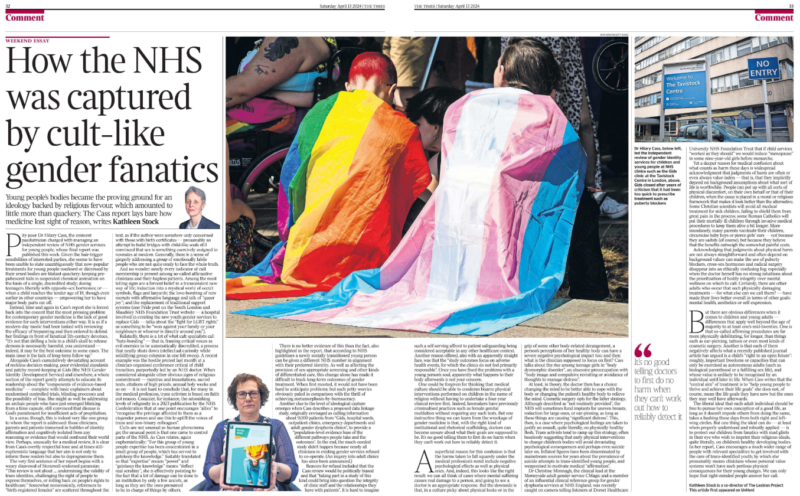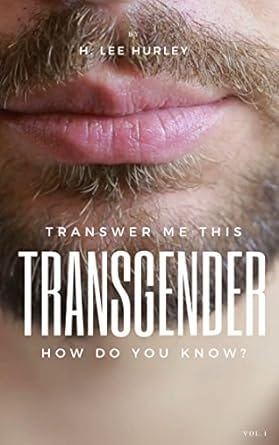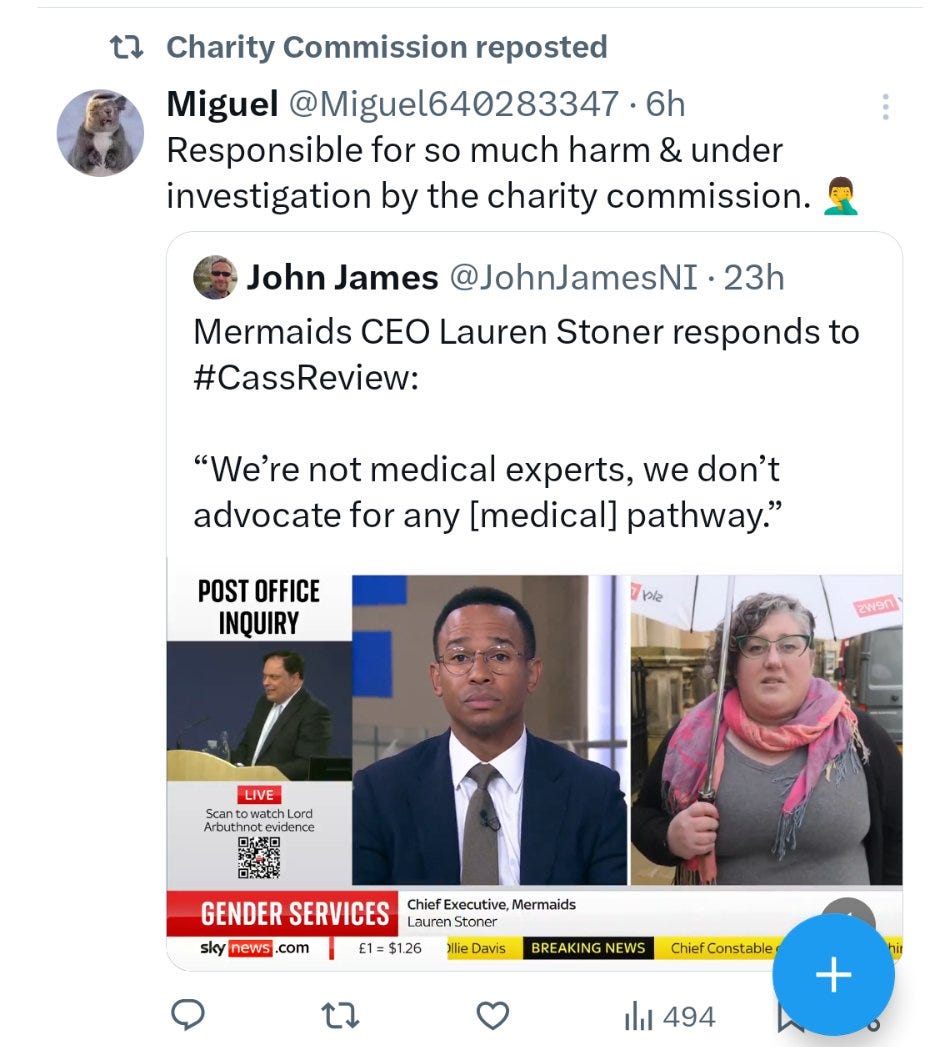The Trans Agenda #24
[15 April 2024]
Welcome to The Trans Agenda, a newsletter that will arrive in your inbox Monday and Thursday if you are subscribed. You can also read it on Substack and on Trans Writes.
Publications known for taking an anti-trans stance are and will be referenced and linked. Often, these are the most comprehensive sources for these stories because of their obsession with trans people. I give a summary for those stories so you can make the choice if you want to click the link or seek out more information elsewhere.
As always, if you have any suggestions, I’m open to feedback and you can contact me using the links on this page near the bottom.
The Trans Agenda
NEWS & POLITICS
Cass Review fight back angers bigots
- The Cass Review continues to dominate all headlines in relation to trans people as the Gender Critical Sex Realist Cult continue their fight against reality. To them, this highly compromised and politicised report was supposed to bring them validation. They had, after all, worked very hard in ensuring it said exactly what they wanted it to say. CR was supposed to prove they were right. Their estranged families and friends were meant to come running back to them with open arms and tearful apologies. Mass arrests were meant to follow.
Of course, none of that has happened because the report is so highly problematic that only people who hate trans people as much as the cult do embrace it, while everybody else can see the major problems with the selective and politicised study that drew predetermined conclusions. The Cass Review is the very opposite of science.
Amnesty International comments on Cass Review’s impact on trans rights in the UK [Amnesty International UK]
- Amnesty International UK has released a statement expressing concerns that the Cass Review is being used by anti-trans groups to undermine the rights of transgender people in the UK.
NHS England vs. patient privacy: The battle over gender clinic data
- A conflict is brewing between NHS England and patient privacy advocates over the proposed use of gender clinic patient data. The Cass Review was unable to get access to data they wanted from adult Gender Identity Clinics (GICs) who refused to release it. Dr. Hilary Cass, who promised a lot of things she didn’t deliver, had promised this data collection would respect privacy rights and cease after the review concluded, but NHS England seems intent on enforcing it. Patient data belongs to the patient, not healthcare providers or the government. Clinics were justified in protecting this data without express patient permission.
Wes Streeting regrets showing trans people basic respect [Pink News]
- Just five months after declaring that trans rights are human rights, Wes Streeting has back-peddled on his support for trans people after the release of the Cass Review, which he heartily endorses [Trans Agenda #23]. In an interview with Harry Cole from The S*n, Streeting said he regrets saying that trans women are women and trans men are men.
Yvette Cooper wants Cass Review implemented ‘as soon as possible’ [Sky News]
- She also said that Labour will work with the Tories to implement the Cass Review. There is only one thing you can count on Labour to do consistently and that’s agree with the Tories.
SNP MP calls for ban on puberty blockers in Scotland following Cass Review [The Scotsman]
- Joanna Cherry, the anti-trans SNP MP, has called for the banning of puberty blockers for minors in Scotland in light of the findings from the Cass Review. It would have been more surprising if she hadn’t, to be honest.
BMJ editor-in-chief comes out as anti-trans and anti-science [Kamran Abbasi]
- Taking to Twitter, Kamran Abbasi, who is the editor-in-chief for the British Medical Journal and editor of the Journal of the Royal Society of Medicine, said, “Critics of the methodology of the systematic reviews that form the basis of the Cass Review are displaying their limited understanding of research methods and evidence based medicine — but that’s what got us into this mess in the first place.” I’d argue it’s people like Abbasi, guided by ideology while egregiously misrepresenting how this ‘study’ was undertaken, is how we got into this ‘mess’.
Study finds trans women athletes at a disadvantage to cisgender women on average [British Journal of Sports Medicine]
- The study aimed to compare the physical capabilities of transgender and cisgender athletes by measuring things like strength, lung function, and aerobic fitness. The study involved different groups: 19 cisgender men, 12 transgender men, 23 transgender women, and 21 cisgender women. They all went through various performance tests in a lab.
Key findings:
- Transgender women vs. Cisgender women:
- Testosterone levels were quite similar between transgender women and cisgender women.
- Transgender women had significantly higher levels of oestrogen.
- Transgender women were stronger in grip strength but had lower lung function and jumping ability relative to their body weight.
- They also showed lower aerobic capacity (V̇O2max), which measures the maximum amount of oxygen the body can use during intense exercise.
- Transgender men vs. Cisgender men:
- Testosterone levels were a bit lower in transgender men compared to cisgender men, but still in a similar range.
- Transgender men had lower grip strength and significantly lower aerobic capacity than cisgender men.
The takeaway from this study is that while there are some differences in physical capacities between transgender and cisgender athletes, these differences are complex and vary depending on the specific physical trait being measured. More research is needed.
- Transgender women vs. Cisgender women:
Charity Commission retweets anti-trans content
- With Sex Matters recently granted charity status, it has long been suspected that the Charity Commission has been compromised. Never was this clearer than when their official Twitter account retweeted an anti-trans tweet. It was quickly undone, but questions still need to be answered. They won’t be, of course, yet had this been a pro-trans tweet the Daily Mail, Telegraph and Times would already be trying to ruin the person’s life.
Keep an eye out for
- The media ramping up personal attacks on professionals who have pointed out problems with the Cass Review.
MEDIA & PAPERS
Sonia Sodha returns [The Observer]
- After a number of weeks of not recycling her one column for The Observer, Sonia Sodha returned this weekend with a piece on the Cass Review. Of course, Sodha, who was present at the anti-trans SEEN meeting held by Guardian journalists during Pride week last year in a bid to make The Guardian/Observer even more anti-trans, can’t stick just to the highly-criticised Cass report, but uses it to invalidate trans identities, something even Cass avoids doing. You can see her article below in the papers section.
BBC reports on European legal changes for transgender individuals [BBC]
- A comprehensive BBC report details recent legal changes across Europe that affect trans people, including gender and name change procedures and the broader impact on trans rights.
Telegraph pay Graham Linehan to write about trans people [Telegraph]
- Do I really need to add anything to this? You can see the article in the papers section below.
JK Rowling goes global
- The ‘news’ that JK Rowling will not accept an apology, that hasn’t been offered by Daniel Radcliffe or Emma Watson, made news websites across the globe. There has also been an exponential rise in the number of columnists licking Rowling’s boots since the release of the Cass Review to the point where my searches for news impacting trans people were dominated by mentions of ‘JK Rowling’ more than ‘trans’.
THE PAPERS – Friday 12 April 2024 – Monday 15 April 2024
We’ve got four days of papers featuring The Guardian, Observer, Times, Mail and Telegraph. At my count, there are 41 articles featuring columns from Julie Bindel, Jan Moir, Graham Linehan, Kathleen Stock, Kemi Badenoch, Andrew Neil and Sonia Sodha. The number of those articles featuring a trans person in a positive light? Two, which is higher than usual.
Friday 12 April
The Guardian
![Skip to main contentSwitch To Accessibility Mode CATALOG FOR YOU MORE 12 Apr 2024 Gift Cards Hotspot Buttons.Search Options Aa Aa Aa Aa Aa Aa Aa Aa Aa My Publication The Guardian 12 Apr 2024 Page View Text View REPORTERS user-pictures/d77a9724-87ea-4145-999e-10450ed9d87b Julian Borger user-pictures/56f81241-3c2a-4cf4-9fc9-f3ae36336926 Mark Sweney user-pictures/109cfb64-5072-49a5-93f3-519c7b9454fe Jessica Elgot user-pictures/a9c2b5fc-d6e4-4676-bff0-1e7287b4dfd5 Henry McDonald user-pictures/97e1872d-087e-44a5-a315-22788e66e64e Lauren Gambino (laurenegambino) user-pictures/059aff7a-500c-43c6-b2c8-9848b2726c84 Owen Bowcott user-pictures/db29bee3-a24d-4007-96ac-42a142bc0c81 Steven Morris user-pictures/bc9cbc71-3955-42d1-be64-53d83aceb7d3 Rebecca Smithers user-pictures/0cd98590-b4f3-4f46-a24a-dea93751b097 Jamie Grierson user-pictures/3f61392e-fe28-40a6-b985-fe0d4ee7009a Vikram Dodd user-pictures/7c77d671-aa60-4646-98f2-03b9a80521cb Stephanie Convery user-pictures/da1fbb17-3192-44cb-ab71-2d7eb94307e0 Heather Stewart user-pictures/ef0cc058-961a-44ae-a75f-1434a27e3378 Hannah EllisPetersen user-pictures/03ffc4bb-4a8a-432c-a4bc-5a86fb3ad647 Graham Ruddick user-pictures/23eb973f-6015-4100-996e-19379bdcd610 Larry Elliott user-pictures/f5e7bcb6-bb59-4988-a428-3bc2939eefd9 Robert Booth (The Guardian) user-pictures/02a3a898-4b0e-45c5-9a00-b38195c52d67 Louise Tickle user-pictures/8f6bbec9-7319-46b5-b099-0eec3c9ae70e Maev Kennedy user-pictures/a72749ca-360b-4917-991b-0f60b2989049 Sune Engel Rasmussen user-pictures/ea8bcb62-9234-4b96-9664-21187d7207a7 Harriet Sherwood user-pictures/e955111f-84eb-4be2-baa7-3dfc89081b7b Anushka Asthana user-pictures/99a33be4-926d-4ab2-9c3d-ff7514af947e Rowena Mason user-pictures/b8e37994-a71b-475a-9785-cfe3aaaa435d Angelique Chrisafis user-pictures/048b9870-0e1a-4cd1-bfed-7445746b95da Rupert Neate user-pictures/d3deb1db-f4e0-41fd-a76c-60e541868c16 Justin McCurry user-pictures/d13ec55a-e381-40a6-87d5-a726db4392a9 Frances Perraudin user-pictures/4e386dd9-1be1-47ee-8e59-ecd84c04f9dc Haroon Siddique user-pictures/25ce5ee7-aab5-49b4-8618-7de6f44c96f5 Sally Weale user-pictures/697d5ddd-d26c-409d-a5a6-85886d17dd6b Hilary Osborne user-pictures/5667ff93-1a37-4be7-bf40-df4c9fe84356 Simon Goodley More... 44431 Navigated EnglishРусский EnglishРусский EnglishРусский EnglishРусский EnglishРусский EnglishРусский EnglishРусский EnglishРусский EnglishРусский EnglishРусский EnglishРусский EnglishРусский EnglishРусский EnglishРусский EnglishРусский EnglishРусский EnglishРусский EnglishРусский EnglishРусский EnglishРусский EnglishРусский EnglishРусский EnglishРусский EnglishРусский EnglishРусский EnglishРусский EnglishРусский EnglishРусский EnglishРусский EnglishРусский EnglishРусский EnglishРусский EnglishРусский EnglishРусский EnglishРусский EnglishРусский EnglishРусский EnglishРусский EnglishРусский EnglishРусский EnglishРусский EnglishРусский EnglishРусский EnglishРусский EnglishРусский EnglishРусский EnglishРусский EnglishРусский EnglishРусский EnglishРусский EnglishРусский EnglishРусский EnglishРусский EnglishРусский EnglishРусский EnglishРусский EnglishРусский EnglishРусский EnglishРусский EnglishРусский EnglishРусский EnglishРусский EnglishРусский EnglishРусский EnglishРусский EnglishРусский EnglishРусский EnglishРусский EnglishРусский EnglishРусский EnglishРусский EnglishРусский EnglishРусский EnglishРусский EnglishРусский EnglishРусский EnglishРусский EnglishРусский EnglishРусский EnglishРусский EnglishРусский EnglishРусский EnglishРусский EnglishРусский EnglishРусский EnglishРусский EnglishРусский EnglishРусский EnglishРусский EnglishРусский EnglishРусский EnglishРусский EnglishРусский EnglishРусский EnglishРусский EnglishРусский EnglishРусский EnglishРусский EnglishРусский EnglishРусский EnglishРусский EnglishРусский EnglishРусский EnglishРусский EnglishРусский Regulator to act against private clinics defying NHS ban on puberty blockers The Guardian12 Apr 2024Denis Campbell Health policy editor England’s health regulator will take action against private clinics that prescribe puberty blockers to under-18s despite the NHS’s ban on the drugs. The Care Quality Commission (CQC) will check that private providers of care to those who are questioning their gender identity are applying new guidance recommended by Dr Hilary Cass. In a report this week Cass said puberty blockers had not been proven to reduce gender dysphoria or improve body satisfaction, may damage a teenager’s ability to think and reason and that the rationale for suppressing puberty at all “remains unclear”. The former president of the Royal College of Paediatrics and Child Health made clear her view, which NHS England adopted last month, that they should no longer be given to anyone under 18 on safety grounds. The CQC plans to ensure Cass’s approach is followed by all clinics, not just the NHS, given concern from doctors and campaigners that private outfits may keep prescribing the drugs and create “two-tier” access dependent on wealth. “A very dangerous loophole” could allow private clinics to cash in on the demand for puberty blockers, a doctor who backs Cass’s plan told the Guardian. The regulator will check if licensed healthcare providers are taking into account the recommendations of the Cass review when it registers and inspects them. A private clinic found to be issuing puberty blockers to anyone under 18 could be disciplined if a prescription was found to breach their legal duty to provide “safe care and treatment”, based on the evidence analysed in the inquiry. “If a private organisation registered with the CQC fails to meet the condition of its registration, then the regulator can take enforcement action,” a Whitehall source said. The CQC has various powers at its disposal including, as a last resort, withdrawing the legal permission for a provider to operate. Victoria Atkins, the health secretary, said yesterday that private providers would not be allowed to avoid adhering to the treatment approach Cass proposed. She wrote in the Daily Telegraph: “I am clear in my expectation that private providers must fall in line too [with the NHS’s new approach to puberty blockers].” Some doubt remains as to whether NHS guidelines can be made mandatory for private clinics. “The CQC will expect all private providers to take into account the Cass recommendations. But they don’t have to. Private providers aren’t bound by Cass’s recommendations”, a source explained. At present no CQC-registered private gender care clinic issues puberty blockers. A CQC spokesperson said: “Best practice guidance for gender identity clinics will be considered by internal specialist advisers during registration and regulatory assessments.” One clinic, Gender Plus, run by the clinical psychologist Dr Aidan Kelly, offers masculinising or feminising hormones to 16- to 18-year-olds but not puberty blockers. Doctors should exercise “extreme caution” before issuing such hormones, Cass said. Sue Evans, a nurse who worked at the NHS trust that hosted the gender identity development service for children and young people with gender dysphoria, is challenging the legality of the CQC’s decision to recognise Gender Plus’s clinic as a provider of healthcare. Article Name:Regulator to act against private clinics defying NHS ban on puberty blockers Publication:The Guardian Author:Denis Campbell Health policy editor Start Page:13 End Page:13 Skip to main contentSwitch To Accessibility Mode CATALOG FOR YOU MORE 12 Apr 2024 Gift Cards Hotspot Buttons.Search Options Aa Aa Aa Aa Aa Aa Aa Aa Aa My Publication The Guardian 12 Apr 2024 Page View Text View REPORTERS user-pictures/d77a9724-87ea-4145-999e-10450ed9d87b Julian Borger user-pictures/56f81241-3c2a-4cf4-9fc9-f3ae36336926 Mark Sweney user-pictures/109cfb64-5072-49a5-93f3-519c7b9454fe Jessica Elgot user-pictures/a9c2b5fc-d6e4-4676-bff0-1e7287b4dfd5 Henry McDonald user-pictures/97e1872d-087e-44a5-a315-22788e66e64e Lauren Gambino (laurenegambino) user-pictures/059aff7a-500c-43c6-b2c8-9848b2726c84 Owen Bowcott user-pictures/db29bee3-a24d-4007-96ac-42a142bc0c81 Steven Morris user-pictures/bc9cbc71-3955-42d1-be64-53d83aceb7d3 Rebecca Smithers user-pictures/0cd98590-b4f3-4f46-a24a-dea93751b097 Jamie Grierson user-pictures/3f61392e-fe28-40a6-b985-fe0d4ee7009a Vikram Dodd user-pictures/7c77d671-aa60-4646-98f2-03b9a80521cb Stephanie Convery user-pictures/da1fbb17-3192-44cb-ab71-2d7eb94307e0 Heather Stewart user-pictures/ef0cc058-961a-44ae-a75f-1434a27e3378 Hannah EllisPetersen user-pictures/03ffc4bb-4a8a-432c-a4bc-5a86fb3ad647 Graham Ruddick user-pictures/23eb973f-6015-4100-996e-19379bdcd610 Larry Elliott user-pictures/f5e7bcb6-bb59-4988-a428-3bc2939eefd9 Robert Booth (The Guardian) user-pictures/02a3a898-4b0e-45c5-9a00-b38195c52d67 Louise Tickle user-pictures/8f6bbec9-7319-46b5-b099-0eec3c9ae70e Maev Kennedy user-pictures/a72749ca-360b-4917-991b-0f60b2989049 Sune Engel Rasmussen user-pictures/ea8bcb62-9234-4b96-9664-21187d7207a7 Harriet Sherwood user-pictures/e955111f-84eb-4be2-baa7-3dfc89081b7b Anushka Asthana user-pictures/99a33be4-926d-4ab2-9c3d-ff7514af947e Rowena Mason user-pictures/b8e37994-a71b-475a-9785-cfe3aaaa435d Angelique Chrisafis user-pictures/048b9870-0e1a-4cd1-bfed-7445746b95da Rupert Neate user-pictures/d3deb1db-f4e0-41fd-a76c-60e541868c16 Justin McCurry user-pictures/d13ec55a-e381-40a6-87d5-a726db4392a9 Frances Perraudin user-pictures/4e386dd9-1be1-47ee-8e59-ecd84c04f9dc Haroon Siddique user-pictures/25ce5ee7-aab5-49b4-8618-7de6f44c96f5 Sally Weale user-pictures/697d5ddd-d26c-409d-a5a6-85886d17dd6b Hilary Osborne user-pictures/5667ff93-1a37-4be7-bf40-df4c9fe84356 Simon Goodley More... 44431 Navigated EnglishРусский EnglishРусский EnglishРусский EnglishРусский EnglishРусский EnglishРусский EnglishРусский EnglishРусский EnglishРусский EnglishРусский EnglishРусский EnglishРусский EnglishРусский EnglishРусский EnglishРусский EnglishРусский EnglishРусский EnglishРусский EnglishРусский EnglishРусский EnglishРусский EnglishРусский EnglishРусский EnglishРусский EnglishРусский EnglishРусский EnglishРусский EnglishРусский EnglishРусский EnglishРусский EnglishРусский EnglishРусский EnglishРусский EnglishРусский EnglishРусский EnglishРусский EnglishРусский EnglishРусский EnglishРусский EnglishРусский EnglishРусский EnglishРусский EnglishРусский EnglishРусский EnglishРусский EnglishРусский EnglishРусский EnglishРусский EnglishРусский EnglishРусский EnglishРусский EnglishРусский EnglishРусский EnglishРусский EnglishРусский EnglishРусский EnglishРусский EnglishРусский EnglishРусский EnglishРусский EnglishРусский EnglishРусский EnglishРусский EnglishРусский EnglishРусский EnglishРусский EnglishРусский EnglishРусский EnglishРусский EnglishРусский EnglishРусский EnglishРусский EnglishРусский EnglishРусский EnglishРусский EnglishРусский EnglishРусский EnglishРусский EnglishРусский EnglishРусский EnglishРусский EnglishРусский EnglishРусский EnglishРусский EnglishРусский EnglishРусский EnglishРусский EnglishРусский EnglishРусский EnglishРусский EnglishРусский EnglishРусский EnglishРусский EnglishРусский EnglishРусский EnglishРусский EnglishРусский EnglishРусский EnglishРусский EnglishРусский EnglishРусский EnglishРусский EnglishРусский EnglishРусский EnglishРусский Regulator to act against private clinics defying NHS ban on puberty blockers The Guardian12 Apr 2024Denis Campbell Health policy editor England’s health regulator will take action against private clinics that prescribe puberty blockers to under-18s despite the NHS’s ban on the drugs. The Care Quality Commission (CQC) will check that private providers of care to those who are questioning their gender identity are applying new guidance recommended by Dr Hilary Cass. In a report this week Cass said puberty blockers had not been proven to reduce gender dysphoria or improve body satisfaction, may damage a teenager’s ability to think and reason and that the rationale for suppressing puberty at all “remains unclear”. The former president of the Royal College of Paediatrics and Child Health made clear her view, which NHS England adopted last month, that they should no longer be given to anyone under 18 on safety grounds. The CQC plans to ensure Cass’s approach is followed by all clinics, not just the NHS, given concern from doctors and campaigners that private outfits may keep prescribing the drugs and create “two-tier” access dependent on wealth. “A very dangerous loophole” could allow private clinics to cash in on the demand for puberty blockers, a doctor who backs Cass’s plan told the Guardian. The regulator will check if licensed healthcare providers are taking into account the recommendations of the Cass review when it registers and inspects them. A private clinic found to be issuing puberty blockers to anyone under 18 could be disciplined if a prescription was found to breach their legal duty to provide “safe care and treatment”, based on the evidence analysed in the inquiry. “If a private organisation registered with the CQC fails to meet the condition of its registration, then the regulator can take enforcement action,” a Whitehall source said. The CQC has various powers at its disposal including, as a last resort, withdrawing the legal permission for a provider to operate. Victoria Atkins, the health secretary, said yesterday that private providers would not be allowed to avoid adhering to the treatment approach Cass proposed. She wrote in the Daily Telegraph: “I am clear in my expectation that private providers must fall in line too [with the NHS’s new approach to puberty blockers].” Some doubt remains as to whether NHS guidelines can be made mandatory for private clinics. “The CQC will expect all private providers to take into account the Cass recommendations. But they don’t have to. Private providers aren’t bound by Cass’s recommendations”, a source explained. At present no CQC-registered private gender care clinic issues puberty blockers. A CQC spokesperson said: “Best practice guidance for gender identity clinics will be considered by internal specialist advisers during registration and regulatory assessments.” One clinic, Gender Plus, run by the clinical psychologist Dr Aidan Kelly, offers masculinising or feminising hormones to 16- to 18-year-olds but not puberty blockers. Doctors should exercise “extreme caution” before issuing such hormones, Cass said. Sue Evans, a nurse who worked at the NHS trust that hosted the gender identity development service for children and young people with gender dysphoria, is challenging the legality of the CQC’s decision to recognise Gender Plus’s clinic as a provider of healthcare. Article Name:Regulator to act against private clinics defying NHS ban on puberty blockers Publication:The Guardian Author:Denis Campbell Health policy editor Start Page:13 End Page:13](https://substackcdn.com/image/fetch/w_1456,c_limit,f_auto,q_auto:good,fl_progressive:steep/https%3A%2F%2Fsubstack-post-media.s3.amazonaws.com%2Fpublic%2Fimages%2F40ad9aba-6fbd-4656-87e5-77b07e743f81_1175x562.png)
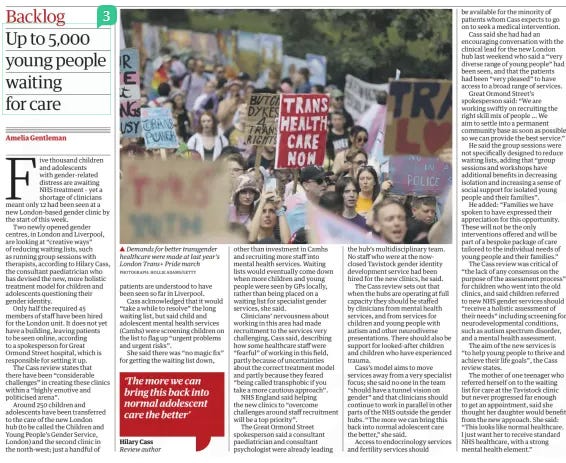
The Times
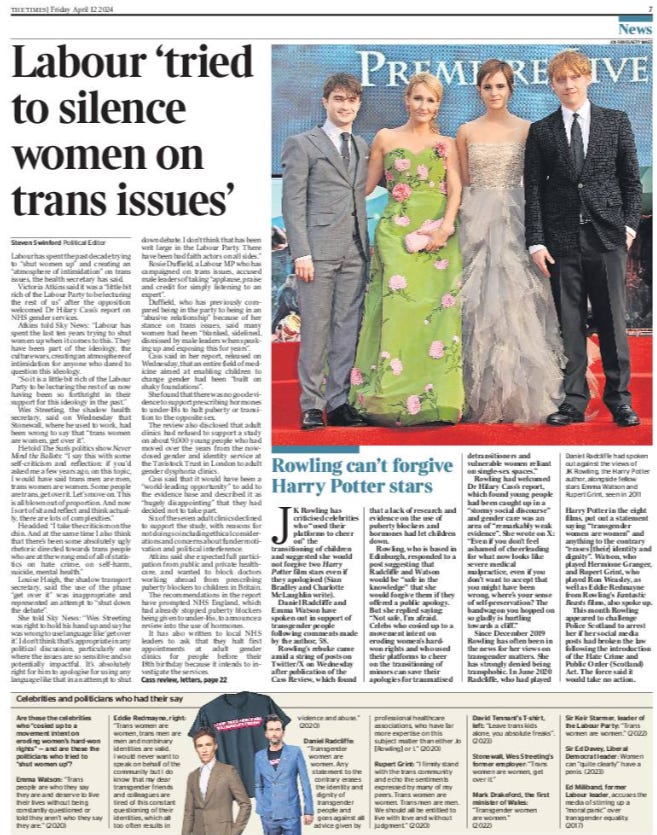
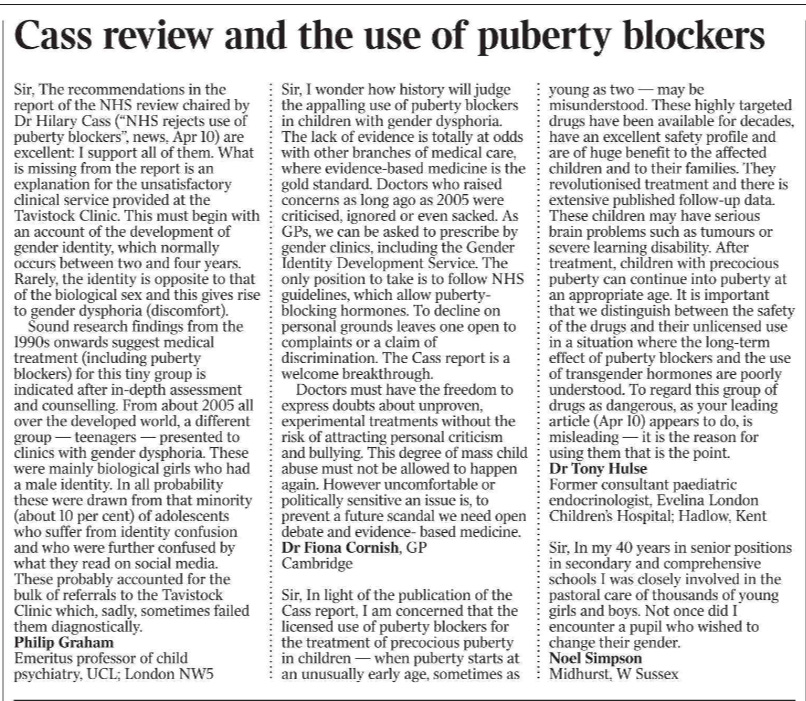
Daily Mail
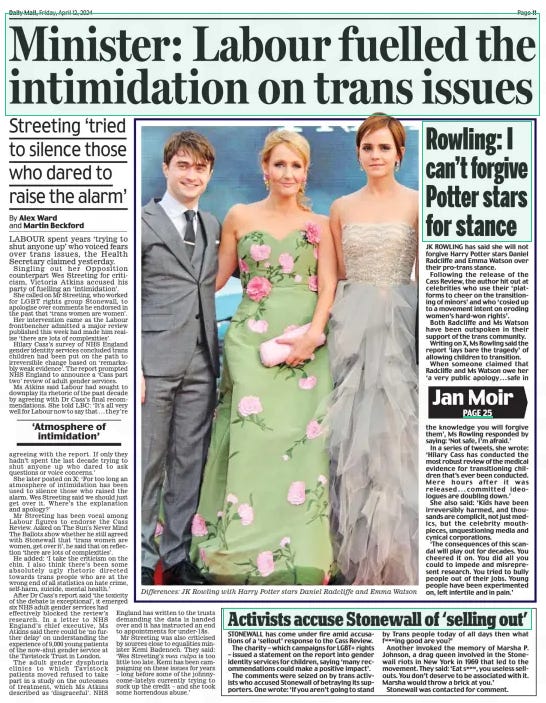

Daily Telegraph
![Leading trans doctor snubbed Cass review Dr Derek Glidden, the NHS’S leading adviser on gender dysphoria, ignored calls to share patient data The Daily Telegraph12 Apr 2024By Michael Searles and Laura Donnelly Dr Derek Glidden is clinical director of the Nottingham Centre for Transgender Health The NHS’S most senior adviser on transgender health refused to share data about his clinic’s patients with the Cass review. Dr Hilary Cass said efforts to track about 9,000 children who went on to be seen by adult services were “thwarted” by the refusal of clinics to provide evidence. it has now emerged that Derek Glidden, clinical director of the Nottingham Centre for Transgender Health, refused to comply despite being NHS England’s gender dysphoria national speciality adviser. THE NHS’S most senior adviser on transgender health refused to share data about his clinic’s patients with the Cass Review. Dr Hilary Cass said efforts to track the journeys of about 9,000 children who went on to be seen by adult services were “thwarted” by the refusal of clinics to provide evidence. Researchers were trying to establish the long-term consequences of medical interventions by seeking data from adult clinics, which take patients from the age of 16. Six of the seven clinics which run adult gender services refused to comply with the request. They include the Nottingham Centre for Transgender Health, one of the leading centres in the country. Dr Derek Glidden, its clinical director, refused to comply despite being NHS England’s gender dysphoria national speciality adviser. He chairs the NHS England clinical Reference Group on gender dysphoria, while another of its five members, Dr Laura Charlton, the clinical lead at Leeds Gender Identity Clinic, also refused to participate in the research. The Nottingham clinic has been key to the rollout of a wave of experimental trans services. It has links to the Indigo Gender Service in Manchester, which describes itself as “trans and non-binary led”, and to a recent scheme in Sussex that has put GPS in charge. Campaigners have raised concerns about the pilot schemes, with one likening them to “the Wild West”, saying responsibility for life-changing decisions was being handed to those with inadequate specialist knowledge. As chair of the NHS Clinical Reference Group on gender dysphoria, Dr Glidden advises its national programme board, which commissioned the rollout. Dr Charlton, a clinical psychologist, worked at the controversial and now shut down Tavistock Gender Identity Development Service (GIDS) from 2014 to 2020 and has defended the clinic. In 2022, she was one of the coordinators of a joint letter which took issue with how the GIDS service was being portrayed. The clinical leads of the NHS Gender Identity Clinics in Northampton, Newcastle and Sheffield also refused to cooperate with the Cass Review, as did the discredited clinic at the Tavistock and Portman NHS Foundation Trust. Just one of the seven units – the Laurels Gender Identity Clinic in Exeter – agreed to supply any evidence. On the eve of the Cass Review, NHS England’s national director of specialised commissioning wrote to NHS hospital leaders operating adult clinics, telling them that “mandatory action” would be taken if clinics did not comply. The letter, seen by The Telegraph, says clinical leads at the clinics failed to co-operate with researchers. It said: “Despite the best efforts of the research team, the necessary cooperation from the clinical leads within the Gender Dysphoria Clinics was not forthcoming, despite – and contrary to – positive assurances from CMOS [chief medical officers].” Victoria Atkins, the Health Secretary, yesterday said the failure of the clinics to comply was “disgraceful”. NHS England said it has now issued instructions to all clinics to take part in the research. Nottingham Centre for Transgender Health, Dr Glidden and Dr Charlton were approached for comment. Article Name:Leading trans doctor snubbed Cass review Publication:The Daily Telegraph Author:By Michael Searles and Laura Donnelly Start Page:9 End Page:9 Leading trans doctor snubbed Cass review Dr Derek Glidden, the NHS’S leading adviser on gender dysphoria, ignored calls to share patient data The Daily Telegraph12 Apr 2024By Michael Searles and Laura Donnelly Dr Derek Glidden is clinical director of the Nottingham Centre for Transgender Health The NHS’S most senior adviser on transgender health refused to share data about his clinic’s patients with the Cass review. Dr Hilary Cass said efforts to track about 9,000 children who went on to be seen by adult services were “thwarted” by the refusal of clinics to provide evidence. it has now emerged that Derek Glidden, clinical director of the Nottingham Centre for Transgender Health, refused to comply despite being NHS England’s gender dysphoria national speciality adviser. THE NHS’S most senior adviser on transgender health refused to share data about his clinic’s patients with the Cass Review. Dr Hilary Cass said efforts to track the journeys of about 9,000 children who went on to be seen by adult services were “thwarted” by the refusal of clinics to provide evidence. Researchers were trying to establish the long-term consequences of medical interventions by seeking data from adult clinics, which take patients from the age of 16. Six of the seven clinics which run adult gender services refused to comply with the request. They include the Nottingham Centre for Transgender Health, one of the leading centres in the country. Dr Derek Glidden, its clinical director, refused to comply despite being NHS England’s gender dysphoria national speciality adviser. He chairs the NHS England clinical Reference Group on gender dysphoria, while another of its five members, Dr Laura Charlton, the clinical lead at Leeds Gender Identity Clinic, also refused to participate in the research. The Nottingham clinic has been key to the rollout of a wave of experimental trans services. It has links to the Indigo Gender Service in Manchester, which describes itself as “trans and non-binary led”, and to a recent scheme in Sussex that has put GPS in charge. Campaigners have raised concerns about the pilot schemes, with one likening them to “the Wild West”, saying responsibility for life-changing decisions was being handed to those with inadequate specialist knowledge. As chair of the NHS Clinical Reference Group on gender dysphoria, Dr Glidden advises its national programme board, which commissioned the rollout. Dr Charlton, a clinical psychologist, worked at the controversial and now shut down Tavistock Gender Identity Development Service (GIDS) from 2014 to 2020 and has defended the clinic. In 2022, she was one of the coordinators of a joint letter which took issue with how the GIDS service was being portrayed. The clinical leads of the NHS Gender Identity Clinics in Northampton, Newcastle and Sheffield also refused to cooperate with the Cass Review, as did the discredited clinic at the Tavistock and Portman NHS Foundation Trust. Just one of the seven units – the Laurels Gender Identity Clinic in Exeter – agreed to supply any evidence. On the eve of the Cass Review, NHS England’s national director of specialised commissioning wrote to NHS hospital leaders operating adult clinics, telling them that “mandatory action” would be taken if clinics did not comply. The letter, seen by The Telegraph, says clinical leads at the clinics failed to co-operate with researchers. It said: “Despite the best efforts of the research team, the necessary cooperation from the clinical leads within the Gender Dysphoria Clinics was not forthcoming, despite – and contrary to – positive assurances from CMOS [chief medical officers].” Victoria Atkins, the Health Secretary, yesterday said the failure of the clinics to comply was “disgraceful”. NHS England said it has now issued instructions to all clinics to take part in the research. Nottingham Centre for Transgender Health, Dr Glidden and Dr Charlton were approached for comment. Article Name:Leading trans doctor snubbed Cass review Publication:The Daily Telegraph Author:By Michael Searles and Laura Donnelly Start Page:9 End Page:9](https://substackcdn.com/image/fetch/w_1456,c_limit,f_auto,q_auto:good,fl_progressive:steep/https%3A%2F%2Fsubstack-post-media.s3.amazonaws.com%2Fpublic%2Fimages%2Fb7304feb-dfbf-42ab-b749-05f0f8d56ea3_1532x419.jpeg)

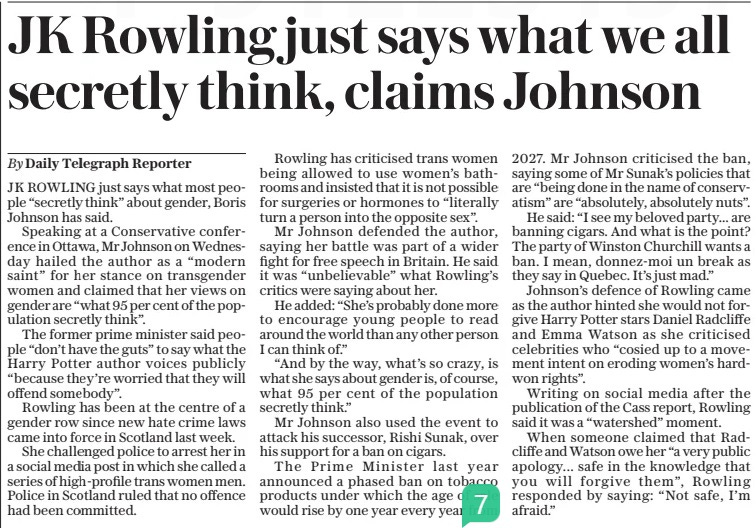
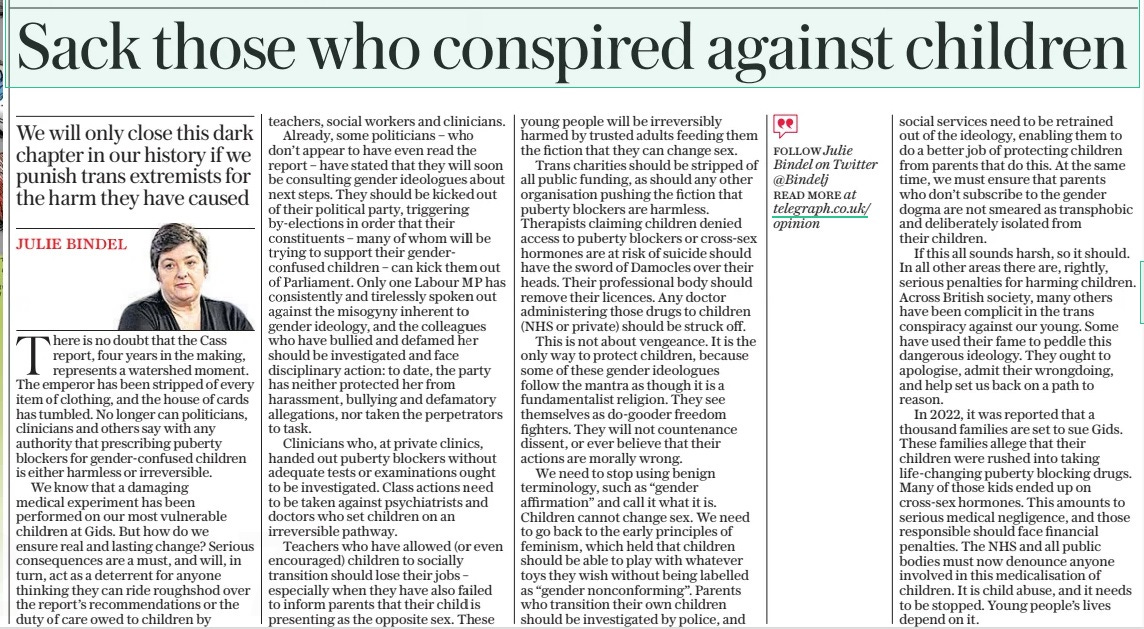
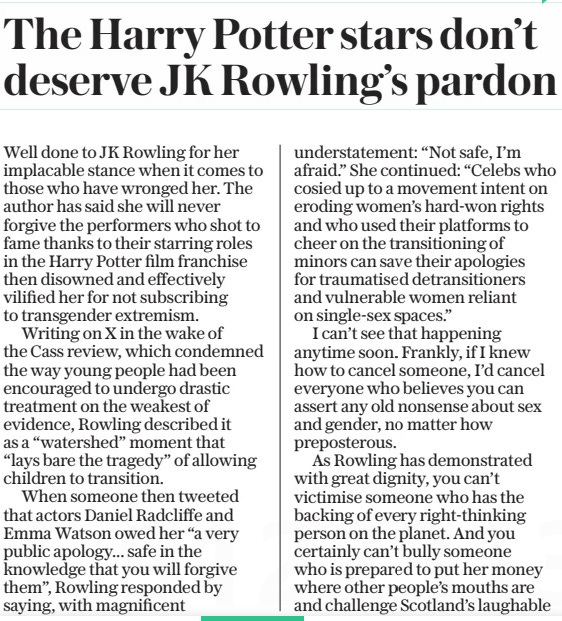
Saturday 13 April
The Guardian
![Streeting: ‘Watershed moment’ for gender identity The Guardian13 Apr 2024Pippa Crerar Wes Streeting said yesterday he wanted the Cass review to be a “watershed moment” in the provision of health services for young people questioning their gender identity, but he understood why some trans people may feel “frightened”. He said that children and young people particularly, but trans people more generally, had been “utterly failed” by the current state of healthcare available but that “we’ve got to get this right” for them. He said the Cass review had created an opportunity to move beyond “some of the toxicity” around the issue to a “more thoughtful, careful and considered” approach. “I’ve gone out of my way, particularly in the wake of the Cass review, not to throw rocks at the Tory party and to see if we can try to build a more positive consensus,” he said. “But that will rely on the Conservative party being more like David Cameron and less like Suella Braverman.” He said the country needed a more “thoughtful and inclusive” conversation about trans rights, and regretted some of the language he had used in the past. “I understand why trans people are frightened,” Streeting said. “There has been an utterly toxic political backdrop in our country that has seen a rise in trans hate crime and has made the job of the Cass review more challenging. “Trans activists have been questioning the motivation [of the report] and fearing whether or not this is going to be a watershed moment that makes things better, or makes things worse. “It has got to be a watershed moment that makes things better for trans people and for young people who may be questioning their gender identity.” Article Name:Streeting: ‘Watershed moment’ for gender identity Publication:The Guardian Author:Pippa Crerar Start Page:10 End Page:10 Streeting: ‘Watershed moment’ for gender identity The Guardian13 Apr 2024Pippa Crerar Wes Streeting said yesterday he wanted the Cass review to be a “watershed moment” in the provision of health services for young people questioning their gender identity, but he understood why some trans people may feel “frightened”. He said that children and young people particularly, but trans people more generally, had been “utterly failed” by the current state of healthcare available but that “we’ve got to get this right” for them. He said the Cass review had created an opportunity to move beyond “some of the toxicity” around the issue to a “more thoughtful, careful and considered” approach. “I’ve gone out of my way, particularly in the wake of the Cass review, not to throw rocks at the Tory party and to see if we can try to build a more positive consensus,” he said. “But that will rely on the Conservative party being more like David Cameron and less like Suella Braverman.” He said the country needed a more “thoughtful and inclusive” conversation about trans rights, and regretted some of the language he had used in the past. “I understand why trans people are frightened,” Streeting said. “There has been an utterly toxic political backdrop in our country that has seen a rise in trans hate crime and has made the job of the Cass review more challenging. “Trans activists have been questioning the motivation [of the report] and fearing whether or not this is going to be a watershed moment that makes things better, or makes things worse. “It has got to be a watershed moment that makes things better for trans people and for young people who may be questioning their gender identity.” Article Name:Streeting: ‘Watershed moment’ for gender identity Publication:The Guardian Author:Pippa Crerar Start Page:10 End Page:10](https://substackcdn.com/image/fetch/w_1456,c_limit,f_auto,q_auto:good,fl_progressive:steep/https%3A%2F%2Fsubstack-post-media.s3.amazonaws.com%2Fpublic%2Fimages%2F5ced2cb1-be1a-423c-93b6-388d6d3e467c_653x702.png)
![Hopes Cass report will end ‘culture of fear’ in gender research The Guardian13 Apr 2024Hannah Devlin Ian Sample PHOTOGRAPH: GUY BELL/REX/SHUTTERSTOCK ▼ A Trans Pride march in London. Many experts on gender are worried about the lack of quality research Critical thinking and open debate are pillars of scientific and medical research. Yet experienced professionals are increasingly scared to openly discuss their views on the treatment of children questioning their gender identity. This was the conclusion drawn by Hilary Cass in her landmark review this week, which said a toxic debate had resulted in a culture of fear. Her conclusion was echoed by doctors, academic researchers and scientists, who have told the Guardian this has had a chilling effect on research in an area in desperate need of better evidence. Some said they had been deterred from pursuing what they believed to be crucial studies, saying merely entering the arena would put their reputation at risk. Others spoke of abuse on social media, academic conferences being shut down, biases in publishing and the personal cost of speaking out. “In most areas of health, medical researchers have freedom to answer questions to problems without fear of judgment,” said Dr Channa Jayasena, a consultant in reproductive endocrinology at Imperial College London. “I’ve never quite known a field where the risks are also in how you’re seen and your beliefs. You have to be careful about what you say both in and out of the workplace.” Sallie Baxendale, a professor of clinical neuropsychology at UCL’s Institute of Neurology, received abuse after publishing a systematic review of studies that investigated the impact of puberty blockers on brain development. Her review found that “critical questions” remained around the nature, extent and permanence of any arrested development of cognitive function linked to the treatment. The paper, which merely summarised the state of relevant research, provoked immediate anger. “I’ve been accused of being an anti-trans activist, and that now comes up on Google and is never going to go away,” Baxendale told the Guardian. The lack of high-quality research is a subject of growing unease among doctors, according to Dr Juliet Singer, a consultant child and adolescent psychiatrist and a former governor of the Tavistock and Portman NHS trust. In 2020, Singer conducted a survey of specialist child psychiatry trainees, which highlighted concerns about the lack of explanation for the exponential growth in referrals to adolescent gender services, the lack of long-term outcome studies on treatments, and insufficient evidence on the long-term effects of hormone blockers. But, she said, raising questions such as what was driving the huge rise in birth-registered girls presenting with gender-related distress in puberty appeared to be deemed “unacceptable” by some senior leaders at the Tavistock. “There’s been a shutting down of anybody who has suggested we need to think about a deeper understanding of why these young people are in such distress,” she said. “It’s been remarkable the difference from other ordinary clinical practice.” Others have found commenting publicly on the scientific merits of work by other academics – normally a routine part of media coverage – has put scientists in the line of fire over trans-related issues. Jayasena described getting hate mail after welcoming a US study in which a trans woman was given hormones to be able to experience breastfeeding and, separately, being accused of transphobia after commenting on research about athletic performance in trans women. “I felt concerns for my safety,” he said. “I find my quotes are weaponised. That is very worrying and most colleagues would never go near this type of topic for that reason.” Another senior researcher in endocrinology, who wished to remain anonymous, said medical professionals had resorted to sharing views on anonymous WhatsApp groups. “The badmouthing and the social media destruction of people’s reputation and careers is so damning,” she said, adding: “This isn’t how good scientific debate happens – it happens when people can talk honestly and without fear.” The risk of being attacked is enough to deter younger researchers from entering the field, Baxendale believes. “It’s tough, I think most people would just walk away. Why risk your reputation? There are many people early in their careers, and I do not blame them one bit, who would not be prepared to accept that.” The situation hampers efforts to establish a firm medical basis for treatments, Baxendale believes. If the best researchers avoid the field, there is a risk it will be dominated by less rigorous scientists and those with an interest in their results supporting particular beliefs. After publishing her review, Baxendale was contacted by a senior expert outside the UK who said they had walked away from a study after being told the team would only publish “positive” findings. Jayasena agrees, saying there has been a perception of research being dominated by “a self-selected cohort of people who will be on either side of the fence and perhaps not so interested in advancing the field”. And in the absence of a robust evidence-base, there had been greater scope for ideology to fill the knowledge gap. “Ultimately I’ve seen completely unhelpful views on both sides,” said Jayasena. Institutionally, this could act as a disincentive for learned societies, NHS bodies and journals to become involved at any level. In an effort to find common ground among academics, doctors, patient groups and campaigners that could be a springboard for objective research, Singer tried to organise a conference at Great Ormond Street hospital in 2022. The meeting was an invite-only academic conference for specialist child psychiatry trainees and consultant child psychiatrists, and Cass was due to present her interim findings, alongside diverse speakers, including former clinicians at the gender identity development service at the Tavistock clinic. “What I wanted to do with the conference was just bring together people with different perspectives,” she said. However, after a significant numbers of complaints and making concessions aimed at achieving a balanced programme, the conference was cancelled by Health Education England (HEE) the day before it was due to take place after a “protected whistleblower’s report” was sent in from someone calling themselves a researcher on anti-trans conspiracy theories. Despite reassurances that it would be reorganised by HEE and the Royal College of Psychiatrists, this is yet to happen. Fuelled by concerns over the poor quality of research, the Cass report has set the stage for a major NHS trial that should start this year. It will look at the safety and efficacy of puberty blockers, but also crosssex hormones that are used to masculinise or feminise people, and psychosocial interventions, with the aim of establishing a robust evidence base. Many are hopeful the Cass report and the NHS trial will draw a line under the in-fighting and abuse and establish a more constructive field of gender medicine. Baxendale is acutely aware that many patients and families will be left this week wondering whether help will be available, whether treatments work and whether they can trust their doctors. “It must be so distressing for them,” she said. “But I think there is hope. The NHS research will be rigorous, it’s balanced to look at benefits and harms, and I think once we’ve got the results we will have a proper service for these kids.” ‘My quotes are weaponised. Most colleagues wouldn’t go near this topic’ Dr Channa Jayasena Imperial College London Article Name:Hopes Cass report will end ‘culture of fear’ in gender research Publication:The Guardian Author:Hannah Devlin Ian Sample Start Page:14 End Page:14 Report has ‘potential for positive change’ The Guardian13 Apr 2024Harriet Sherwood Stephen Whittle, professor of equalities law and co-founder of Press for Change, transitioned as a teenager in 1975 When Stephen Whittle transitioned as a teenager in 1975, he was one of only a handful of young people in the UK to be offered hormone treatment and later surgery. Almost half a century later – much of it spent fighting for trans rights – he said there was “masses” he agreed with in this week’s review of the NHS’s gender identity services by Hilary Cass. He also identified strong influences on the report by groups and individuals with transphobic views, and said the “potential for positive change must be backed with resources”. Whittle, emeritus professor of equalities law at Manchester Metropolitan University, has become one of the UK’s leading advocates for trans rights and has advised governments around the world. Now 68, he views the issues raised in the Cass report with the perspective of decades of personal and professional experience. As a child, “I had no doubt that something was deeply wrong – and I had no doubt what it was,” he said. At one particular school sports day “there were boys’ races and girls’ races, and I suddenly realised that I was always going to be in the wrong race”. After a couple of suicide attempts – “I had no doubt that I couldn’t live as the person people thought I was meant to be” – Whittle was finally seen by a sympathetic doctor. He was offered testosterone, followed four years later by surgery. “My father, who was quite a Victorian man in his attitudes, said: ‘We’ve been waiting for this since you were two’. Ninety per cent of people said it made sense. “But from strangers or people who barely knew me, there was a lot of discrimination and prejudice. I had sexual and physical assaults in the street, and I lost job after job. None of it was easy.” Soon after he transitioned, Whittle met his life partner, Sarah, with whom he has four children. “I hadn’t had surgery at that point, but she never had any doubt that I was the man she saw and knew.” In the mid-1980s, Whittle went to night school and studied for a law degree. He co-founded Press for Change, which campaigned for trans rights, and in 2005 was awarded an OBE for services to gender issues. Young trans people today face “different challenges” to those he experienced, he said. “Getting a job and keeping it is easier for them. But what’s really difficult is [social media]. Online can be a hateful place.” As a teenager questioning his gender, and later as a trans adult, he was very isolated, and worked hard to establish supportive networks of people who met regularly. Now, it is easier to find people going through similar experiences online, but harder to maintain in-person contact. Today there is a greater willingness to explore gender issues than there had been 50 years ago. “You have people at a much younger age asking: ‘Am I trans?’ And then there are those who simply know they belong in a different body.” The Cass report identified multiple problems with gender identity services, Whittle said. “Underfunding, staff overwhelmed, records not properly kept, mental health services in need of massive improvement. But I also think you can see the fingerprints of transphobia on the report.” Some anti-trans organisations had undue influence on government and officials, he said. “Since 2010 I’ve not been included in one conversation with government, none of us have. But these other people are sitting round the table and enjoying their power. I think aspects of the Cass report were heavily influenced by the fear of these people and pressure from them.” Much of what happens after the Cass review would depend on a willingness to properly resource services and provide “a lot of talking therapy” for individuals. “Cass has the potential for positive change but it has to be backed up with significant funding,” he said. Article Name:Report has ‘potential for positive change’ Publication:The Guardian Author:Harriet Sherwood Start Page:15 End Page:15 Hopes Cass report will end ‘culture of fear’ in gender research The Guardian13 Apr 2024Hannah Devlin Ian Sample PHOTOGRAPH: GUY BELL/REX/SHUTTERSTOCK ▼ A Trans Pride march in London. Many experts on gender are worried about the lack of quality research Critical thinking and open debate are pillars of scientific and medical research. Yet experienced professionals are increasingly scared to openly discuss their views on the treatment of children questioning their gender identity. This was the conclusion drawn by Hilary Cass in her landmark review this week, which said a toxic debate had resulted in a culture of fear. Her conclusion was echoed by doctors, academic researchers and scientists, who have told the Guardian this has had a chilling effect on research in an area in desperate need of better evidence. Some said they had been deterred from pursuing what they believed to be crucial studies, saying merely entering the arena would put their reputation at risk. Others spoke of abuse on social media, academic conferences being shut down, biases in publishing and the personal cost of speaking out. “In most areas of health, medical researchers have freedom to answer questions to problems without fear of judgment,” said Dr Channa Jayasena, a consultant in reproductive endocrinology at Imperial College London. “I’ve never quite known a field where the risks are also in how you’re seen and your beliefs. You have to be careful about what you say both in and out of the workplace.” Sallie Baxendale, a professor of clinical neuropsychology at UCL’s Institute of Neurology, received abuse after publishing a systematic review of studies that investigated the impact of puberty blockers on brain development. Her review found that “critical questions” remained around the nature, extent and permanence of any arrested development of cognitive function linked to the treatment. The paper, which merely summarised the state of relevant research, provoked immediate anger. “I’ve been accused of being an anti-trans activist, and that now comes up on Google and is never going to go away,” Baxendale told the Guardian. The lack of high-quality research is a subject of growing unease among doctors, according to Dr Juliet Singer, a consultant child and adolescent psychiatrist and a former governor of the Tavistock and Portman NHS trust. In 2020, Singer conducted a survey of specialist child psychiatry trainees, which highlighted concerns about the lack of explanation for the exponential growth in referrals to adolescent gender services, the lack of long-term outcome studies on treatments, and insufficient evidence on the long-term effects of hormone blockers. But, she said, raising questions such as what was driving the huge rise in birth-registered girls presenting with gender-related distress in puberty appeared to be deemed “unacceptable” by some senior leaders at the Tavistock. “There’s been a shutting down of anybody who has suggested we need to think about a deeper understanding of why these young people are in such distress,” she said. “It’s been remarkable the difference from other ordinary clinical practice.” Others have found commenting publicly on the scientific merits of work by other academics – normally a routine part of media coverage – has put scientists in the line of fire over trans-related issues. Jayasena described getting hate mail after welcoming a US study in which a trans woman was given hormones to be able to experience breastfeeding and, separately, being accused of transphobia after commenting on research about athletic performance in trans women. “I felt concerns for my safety,” he said. “I find my quotes are weaponised. That is very worrying and most colleagues would never go near this type of topic for that reason.” Another senior researcher in endocrinology, who wished to remain anonymous, said medical professionals had resorted to sharing views on anonymous WhatsApp groups. “The badmouthing and the social media destruction of people’s reputation and careers is so damning,” she said, adding: “This isn’t how good scientific debate happens – it happens when people can talk honestly and without fear.” The risk of being attacked is enough to deter younger researchers from entering the field, Baxendale believes. “It’s tough, I think most people would just walk away. Why risk your reputation? There are many people early in their careers, and I do not blame them one bit, who would not be prepared to accept that.” The situation hampers efforts to establish a firm medical basis for treatments, Baxendale believes. If the best researchers avoid the field, there is a risk it will be dominated by less rigorous scientists and those with an interest in their results supporting particular beliefs. After publishing her review, Baxendale was contacted by a senior expert outside the UK who said they had walked away from a study after being told the team would only publish “positive” findings. Jayasena agrees, saying there has been a perception of research being dominated by “a self-selected cohort of people who will be on either side of the fence and perhaps not so interested in advancing the field”. And in the absence of a robust evidence-base, there had been greater scope for ideology to fill the knowledge gap. “Ultimately I’ve seen completely unhelpful views on both sides,” said Jayasena. Institutionally, this could act as a disincentive for learned societies, NHS bodies and journals to become involved at any level. In an effort to find common ground among academics, doctors, patient groups and campaigners that could be a springboard for objective research, Singer tried to organise a conference at Great Ormond Street hospital in 2022. The meeting was an invite-only academic conference for specialist child psychiatry trainees and consultant child psychiatrists, and Cass was due to present her interim findings, alongside diverse speakers, including former clinicians at the gender identity development service at the Tavistock clinic. “What I wanted to do with the conference was just bring together people with different perspectives,” she said. However, after a significant numbers of complaints and making concessions aimed at achieving a balanced programme, the conference was cancelled by Health Education England (HEE) the day before it was due to take place after a “protected whistleblower’s report” was sent in from someone calling themselves a researcher on anti-trans conspiracy theories. Despite reassurances that it would be reorganised by HEE and the Royal College of Psychiatrists, this is yet to happen. Fuelled by concerns over the poor quality of research, the Cass report has set the stage for a major NHS trial that should start this year. It will look at the safety and efficacy of puberty blockers, but also crosssex hormones that are used to masculinise or feminise people, and psychosocial interventions, with the aim of establishing a robust evidence base. Many are hopeful the Cass report and the NHS trial will draw a line under the in-fighting and abuse and establish a more constructive field of gender medicine. Baxendale is acutely aware that many patients and families will be left this week wondering whether help will be available, whether treatments work and whether they can trust their doctors. “It must be so distressing for them,” she said. “But I think there is hope. The NHS research will be rigorous, it’s balanced to look at benefits and harms, and I think once we’ve got the results we will have a proper service for these kids.” ‘My quotes are weaponised. Most colleagues wouldn’t go near this topic’ Dr Channa Jayasena Imperial College London Article Name:Hopes Cass report will end ‘culture of fear’ in gender research Publication:The Guardian Author:Hannah Devlin Ian Sample Start Page:14 End Page:14 Report has ‘potential for positive change’ The Guardian13 Apr 2024Harriet Sherwood Stephen Whittle, professor of equalities law and co-founder of Press for Change, transitioned as a teenager in 1975 When Stephen Whittle transitioned as a teenager in 1975, he was one of only a handful of young people in the UK to be offered hormone treatment and later surgery. Almost half a century later – much of it spent fighting for trans rights – he said there was “masses” he agreed with in this week’s review of the NHS’s gender identity services by Hilary Cass. He also identified strong influences on the report by groups and individuals with transphobic views, and said the “potential for positive change must be backed with resources”. Whittle, emeritus professor of equalities law at Manchester Metropolitan University, has become one of the UK’s leading advocates for trans rights and has advised governments around the world. Now 68, he views the issues raised in the Cass report with the perspective of decades of personal and professional experience. As a child, “I had no doubt that something was deeply wrong – and I had no doubt what it was,” he said. At one particular school sports day “there were boys’ races and girls’ races, and I suddenly realised that I was always going to be in the wrong race”. After a couple of suicide attempts – “I had no doubt that I couldn’t live as the person people thought I was meant to be” – Whittle was finally seen by a sympathetic doctor. He was offered testosterone, followed four years later by surgery. “My father, who was quite a Victorian man in his attitudes, said: ‘We’ve been waiting for this since you were two’. Ninety per cent of people said it made sense. “But from strangers or people who barely knew me, there was a lot of discrimination and prejudice. I had sexual and physical assaults in the street, and I lost job after job. None of it was easy.” Soon after he transitioned, Whittle met his life partner, Sarah, with whom he has four children. “I hadn’t had surgery at that point, but she never had any doubt that I was the man she saw and knew.” In the mid-1980s, Whittle went to night school and studied for a law degree. He co-founded Press for Change, which campaigned for trans rights, and in 2005 was awarded an OBE for services to gender issues. Young trans people today face “different challenges” to those he experienced, he said. “Getting a job and keeping it is easier for them. But what’s really difficult is [social media]. Online can be a hateful place.” As a teenager questioning his gender, and later as a trans adult, he was very isolated, and worked hard to establish supportive networks of people who met regularly. Now, it is easier to find people going through similar experiences online, but harder to maintain in-person contact. Today there is a greater willingness to explore gender issues than there had been 50 years ago. “You have people at a much younger age asking: ‘Am I trans?’ And then there are those who simply know they belong in a different body.” The Cass report identified multiple problems with gender identity services, Whittle said. “Underfunding, staff overwhelmed, records not properly kept, mental health services in need of massive improvement. But I also think you can see the fingerprints of transphobia on the report.” Some anti-trans organisations had undue influence on government and officials, he said. “Since 2010 I’ve not been included in one conversation with government, none of us have. But these other people are sitting round the table and enjoying their power. I think aspects of the Cass report were heavily influenced by the fear of these people and pressure from them.” Much of what happens after the Cass review would depend on a willingness to properly resource services and provide “a lot of talking therapy” for individuals. “Cass has the potential for positive change but it has to be backed up with significant funding,” he said. Article Name:Report has ‘potential for positive change’ Publication:The Guardian Author:Harriet Sherwood Start Page:15 End Page:15](https://substackcdn.com/image/fetch/w_1456,c_limit,f_auto,q_auto:good,fl_progressive:steep/https%3A%2F%2Fsubstack-post-media.s3.amazonaws.com%2Fpublic%2Fimages%2F75885c69-893c-4183-a6d8-a4b0a4645074_845x726.png)
The Times
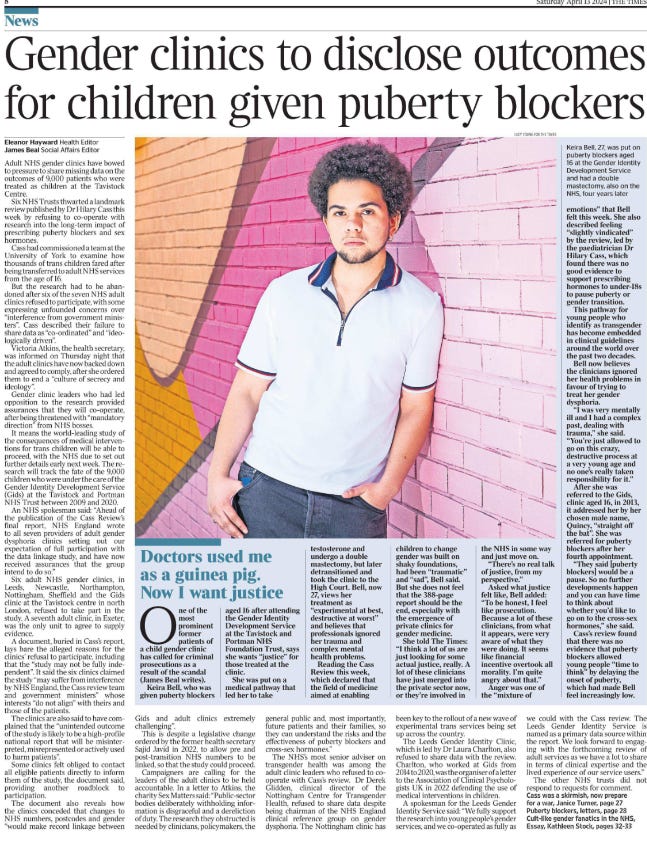
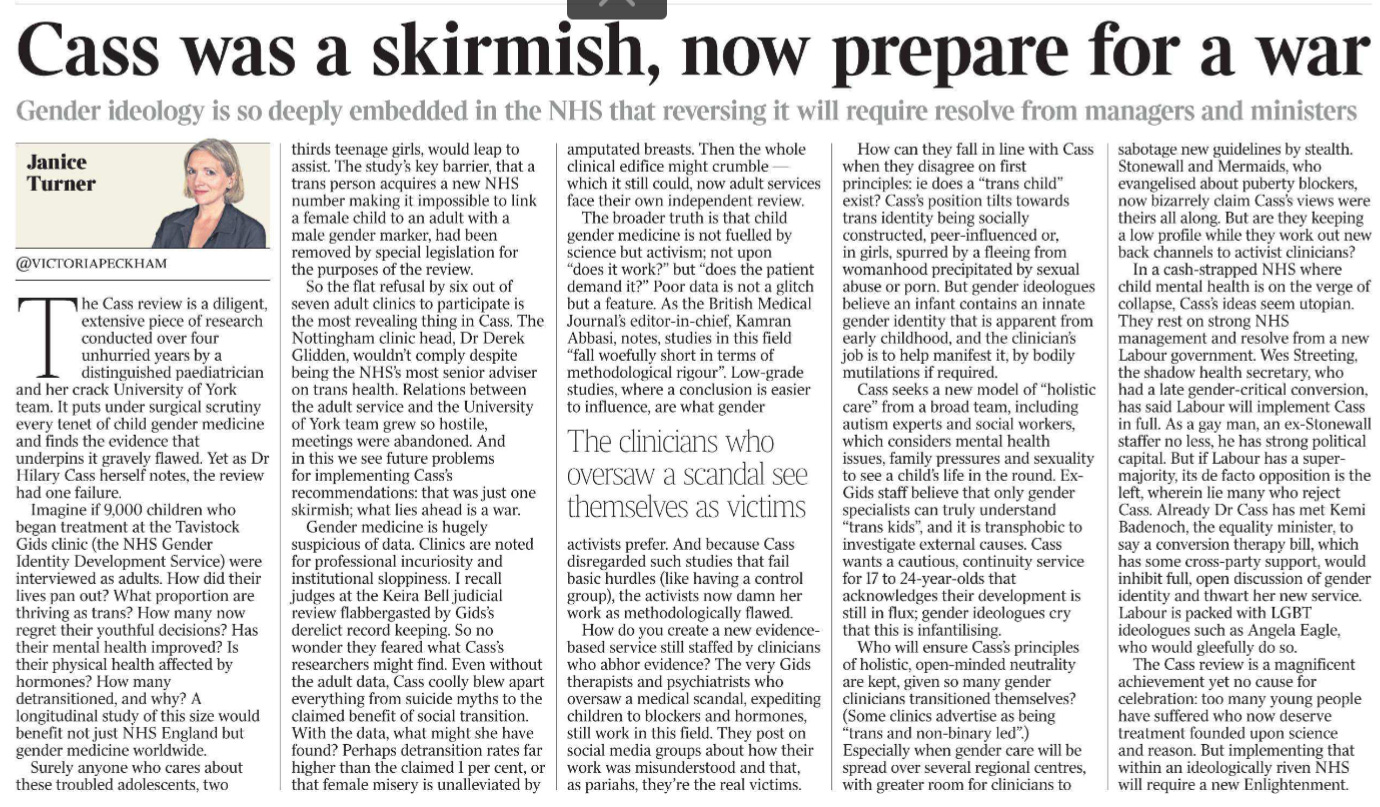
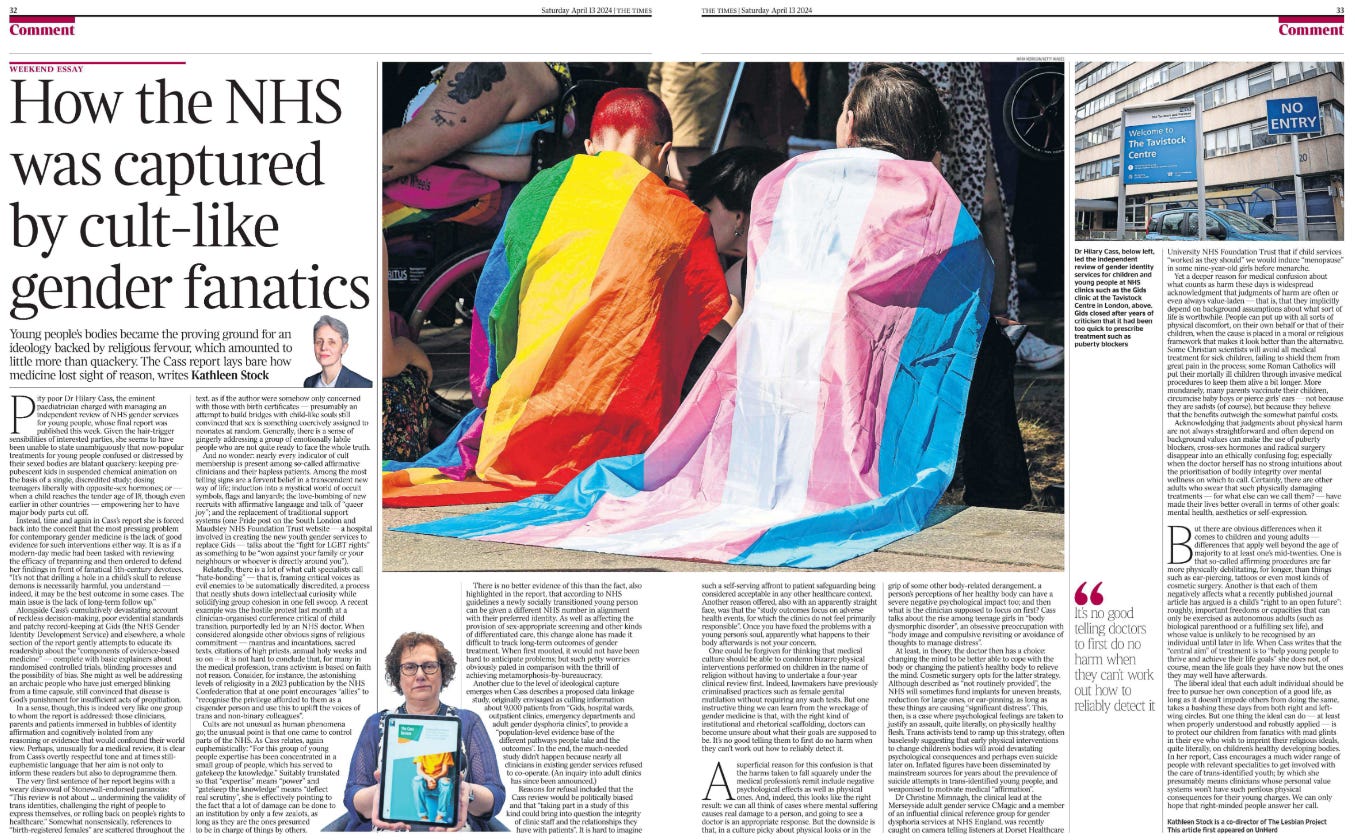
Daily Mail
![In a world full of sophistry and double-speak, J.K. Rowling’s plain-speaking makes her... My heroine for our times Daily Mail13 Apr 2024ANDREW NEIL Cometh the hour, cometh the hero. And what a hero the country — nay, the world — has in J.K. Rowling. the harry Potter author has been in the vanguard of opposing the obsessions of transgender extremists, seeing them for the existential threat to hard-won women’s rights that they are. this week’s Cass Review on managing gender-related distress in the health service has entirely vindicated her warnings that the treatment of young folks confused about their gender is the medical scandal of our time. For good measure, ms Rowling has said she will not forgive the self- entitled, virtue- signalling (now not- so-young) brats, who became global film stars only thanks to the Potter movies, for publicly dissing her over transgender issues when she was merely saying what all reasonable people now know to be the truth. But a superhero’s work is never done. Building on her long-standing concern for women’s wellbeing in Scotland (ms Rowling lives in edinburgh), she has also — almost single-handedly — effectively neutralised Scotland’s absurd new hate crime act (which has nothing to say about misogyny) within days of it becoming law, aptly enough, on April Fool’s Day. At a time when almost anybody associated with the creative industries feels it necessary to recite ad nauseam the fashionable platitudes of the woke, it is remarkable to come across a creative genius — perhaps the world’s most successful author — as fiercely independent as Rowling. Nor is she any kind of fusty old reactionary or conservative. Far from it. She is a committed feminist, who has supported Labour and donated big money to the party. She backed Remain in the 2016 referendum on europe (she is also a doughty defender of Scotland’s continuing place in the Union). But such is her independent frame of mind that when, two years ago, Keir Starmer had trouble defining a woman and was still claiming ‘trans women are women’ Rowling responded that ‘the Labour Party can no longer be counted on to defend women’s rights’. ouch. She has been going head-to-head with trans dogma on social media for at least five years, relentless in exposing an extremist ideology despite the barbaric abuse and frightening threats heaped on her. She has taken it all in her stride, often with humour. ‘hundreds of trans activists have threatened to beat, rape, assassinate and bomb me,’ she wrote. ‘I’ve realised that this movement poses no risk to women whatsoever.’ Yes, she is a wealthy woman who can afford to look after herself. But most rich folk prefer to stay away from controversy and keep a low profile while counting their dosh. She has entered a fray she could have ignored with gusto and conviction, unheeding of the consequences. that’s what heroes do. And after the Cass Review, she stands taller than ever before. It concluded, not before time, that there is ‘remarkably weak evidence’ that giving children puberty blockers is a sensible way to manage gender-related distress. Yet that is what the NHS’s ‘gender identity development service’ did for years at London’s tavistock Clinic. Four years ago Rowling had warned it was essentially a ‘new form of conversion therapy for young gay people’. And so it has transpired. Rowling says the Cass Review is ‘not a triumph’ but the ‘laying bare of a tragedy’, which is well put. But she is understandably unforgiving when it comes to her critics, the extremist tendency of the trans lobby and its know-nothing cheerleaders in the wider world. ‘even if you don’t feel ashamed of cheerleading for what now looks like severe medical malpractice,’ she writes, ‘even if you don’t want to accept that might have been wrong, where’s your sense of selfpreservation? the bandwagon you hopped on so gladly is hurtling towards a cliff.’ When Rowling first took a public stance on this issue, she incurred the wrath of harry Potter stars Daniel Radcliffe and emma Watson. Neither had anything informed to say. they just mouthed the nostrums of the cult. ‘ transgender women are women,’ said Radcliffe. ‘ trans people are who they say they are,’ added Watson, with even less insight than her co-star. But the impact of their intervention was to disown the woman who had done so much for them and to vilify her in the eyes of millions. When someone tweeted that Rowling was no doubt looking forward to their apology in the wake of the Cass Review ‘safe in the knowledge’ she would forgive them, Rowling was implacable: ‘Not safe, I’m afraid. Celebs who cosied up to a movement intent on eroding women’s hard-won rights and who used their platforms to cheer on the transitioning of minors can save their apologies for traumatised detransitioners and vulnerable women reliant on single- sex spaces.’ ouch, again. Rowling is now the essential antidote to those in the trans lobby trying to scuttle away from their crimes. When the current boss of mermaids, a zealous trans pressure group, tried to distance herself from what happened at the tavistock and elsewhere, claiming they’d never advocated any particular ‘medical pathway’, Rowling was devastating. ‘Absolute, total, shameless lies,’ she responded. ‘Your ex- Ceo referred children to the tavistock gender clinic. mermaids has repeatedly claimed puberty blockers are reversible, sent out breast binders to girls as young as 13 and insisted publicly that unless children are affirmed in their trans identities they’ll kill themselves. ‘Your fingerprints are all over the catastrophe of child transition, and those who funded you, campaigned for you and allowed you to embed yourselves in healthcare systems need to be held to account.’ Rowling is a writer of fiction. But it’s clear she’d make a fine journalist. Rowling has been even more fearless in Scotland. In the run-up to the delayed introduction of the new Scottish hate crime law, she shared pictures of ten high-profile trans people and challenged their claims to be women (‘misgendering’ in today’s argot), including a convicted rapist who self-identified as a woman soon after he was found guilty so he could do his time at a women’s prison. ‘ Lovely Scottish lass,’ wrote Rowling, ‘and convicted rapist Isla Bryson found her true authentic female self shortly before she was due to be sentenced. misgendering is hate, so respect Isla’s pronouns.’ Rowling challenged the Scottish police to arrest her: ‘I’m currently out of the country, but if what I’ve written here qualifies as an offence under the terms of the new act, I look forward to being arrested when I return to the birthplace [edinburgh] of the Scottish enlightenment.’ Police Scotland is pretty stupid at the best of times, but not that stupid. Rowling has returned home. She is not behind bars. But the new hate law is already looking like a busted flush. Rowling didn’t leave it there. She offered solidarity with others She has entered a fray she could have ignored Cass Review is the ‘ laying bare of a tragedy’ New hate law is already like a busted f lush accused of misgendering: ‘If they go after any woman for simply calling a man a man, I’ll repeat that woman’s words and they can charge us both at once.’ You can see why Rowling is a feminist icon, feted and admired across the world, however much the trans extremists try to smear her. transgender issues are not really my bag. I’m more at home with inflation, economic growth rates, trade surpluses, money supply. But I was drawn to the matter when I saw a young woman testify before the U.S. Congress about how, as a teenager, she’d had her breasts removed because she thought she wanted to be a man. She was now detransitioning but, as she explained in heartbreaking testimony, the medical mutilation was irreversible. I shed a tear — I doubt I was the only one — and tweeted about it. on a broadcast about my tweets, I was asked if I knew all the ramifications of the matter. I said no, I was new to the subject but was learning fast and took my lead from J.K. Rowling. ‘What she says is what I say,’ I replied. I’m not sure why I said that. I don’t know her, have never met her, have never read her books or even watched a harry Potter film. But in a world in which there are no political heroes and sophistry plus double-speak rule the roost, her plain- speaking is wise, informed, brave and refreshing. Since I tacked my banner to her cause I have never had reason to regret it, especially after recent developments. thank you, J.K. Rowling, my hero for our times. As they say in your adopted city: ‘Lang may yer lum reek.’ Article Name:In a world full of sophistry and double-speak, J.K. Rowling’s plain-speaking makes her... My heroine for our times Publication:Daily Mail Author:ANDREW NEIL Start Page:23 End Page:23 In a world full of sophistry and double-speak, J.K. Rowling’s plain-speaking makes her... My heroine for our times Daily Mail13 Apr 2024ANDREW NEIL Cometh the hour, cometh the hero. And what a hero the country — nay, the world — has in J.K. Rowling. the harry Potter author has been in the vanguard of opposing the obsessions of transgender extremists, seeing them for the existential threat to hard-won women’s rights that they are. this week’s Cass Review on managing gender-related distress in the health service has entirely vindicated her warnings that the treatment of young folks confused about their gender is the medical scandal of our time. For good measure, ms Rowling has said she will not forgive the self- entitled, virtue- signalling (now not- so-young) brats, who became global film stars only thanks to the Potter movies, for publicly dissing her over transgender issues when she was merely saying what all reasonable people now know to be the truth. But a superhero’s work is never done. Building on her long-standing concern for women’s wellbeing in Scotland (ms Rowling lives in edinburgh), she has also — almost single-handedly — effectively neutralised Scotland’s absurd new hate crime act (which has nothing to say about misogyny) within days of it becoming law, aptly enough, on April Fool’s Day. At a time when almost anybody associated with the creative industries feels it necessary to recite ad nauseam the fashionable platitudes of the woke, it is remarkable to come across a creative genius — perhaps the world’s most successful author — as fiercely independent as Rowling. Nor is she any kind of fusty old reactionary or conservative. Far from it. She is a committed feminist, who has supported Labour and donated big money to the party. She backed Remain in the 2016 referendum on europe (she is also a doughty defender of Scotland’s continuing place in the Union). But such is her independent frame of mind that when, two years ago, Keir Starmer had trouble defining a woman and was still claiming ‘trans women are women’ Rowling responded that ‘the Labour Party can no longer be counted on to defend women’s rights’. ouch. She has been going head-to-head with trans dogma on social media for at least five years, relentless in exposing an extremist ideology despite the barbaric abuse and frightening threats heaped on her. She has taken it all in her stride, often with humour. ‘hundreds of trans activists have threatened to beat, rape, assassinate and bomb me,’ she wrote. ‘I’ve realised that this movement poses no risk to women whatsoever.’ Yes, she is a wealthy woman who can afford to look after herself. But most rich folk prefer to stay away from controversy and keep a low profile while counting their dosh. She has entered a fray she could have ignored with gusto and conviction, unheeding of the consequences. that’s what heroes do. And after the Cass Review, she stands taller than ever before. It concluded, not before time, that there is ‘remarkably weak evidence’ that giving children puberty blockers is a sensible way to manage gender-related distress. Yet that is what the NHS’s ‘gender identity development service’ did for years at London’s tavistock Clinic. Four years ago Rowling had warned it was essentially a ‘new form of conversion therapy for young gay people’. And so it has transpired. Rowling says the Cass Review is ‘not a triumph’ but the ‘laying bare of a tragedy’, which is well put. But she is understandably unforgiving when it comes to her critics, the extremist tendency of the trans lobby and its know-nothing cheerleaders in the wider world. ‘even if you don’t feel ashamed of cheerleading for what now looks like severe medical malpractice,’ she writes, ‘even if you don’t want to accept that might have been wrong, where’s your sense of selfpreservation? the bandwagon you hopped on so gladly is hurtling towards a cliff.’ When Rowling first took a public stance on this issue, she incurred the wrath of harry Potter stars Daniel Radcliffe and emma Watson. Neither had anything informed to say. they just mouthed the nostrums of the cult. ‘ transgender women are women,’ said Radcliffe. ‘ trans people are who they say they are,’ added Watson, with even less insight than her co-star. But the impact of their intervention was to disown the woman who had done so much for them and to vilify her in the eyes of millions. When someone tweeted that Rowling was no doubt looking forward to their apology in the wake of the Cass Review ‘safe in the knowledge’ she would forgive them, Rowling was implacable: ‘Not safe, I’m afraid. Celebs who cosied up to a movement intent on eroding women’s hard-won rights and who used their platforms to cheer on the transitioning of minors can save their apologies for traumatised detransitioners and vulnerable women reliant on single- sex spaces.’ ouch, again. Rowling is now the essential antidote to those in the trans lobby trying to scuttle away from their crimes. When the current boss of mermaids, a zealous trans pressure group, tried to distance herself from what happened at the tavistock and elsewhere, claiming they’d never advocated any particular ‘medical pathway’, Rowling was devastating. ‘Absolute, total, shameless lies,’ she responded. ‘Your ex- Ceo referred children to the tavistock gender clinic. mermaids has repeatedly claimed puberty blockers are reversible, sent out breast binders to girls as young as 13 and insisted publicly that unless children are affirmed in their trans identities they’ll kill themselves. ‘Your fingerprints are all over the catastrophe of child transition, and those who funded you, campaigned for you and allowed you to embed yourselves in healthcare systems need to be held to account.’ Rowling is a writer of fiction. But it’s clear she’d make a fine journalist. Rowling has been even more fearless in Scotland. In the run-up to the delayed introduction of the new Scottish hate crime law, she shared pictures of ten high-profile trans people and challenged their claims to be women (‘misgendering’ in today’s argot), including a convicted rapist who self-identified as a woman soon after he was found guilty so he could do his time at a women’s prison. ‘ Lovely Scottish lass,’ wrote Rowling, ‘and convicted rapist Isla Bryson found her true authentic female self shortly before she was due to be sentenced. misgendering is hate, so respect Isla’s pronouns.’ Rowling challenged the Scottish police to arrest her: ‘I’m currently out of the country, but if what I’ve written here qualifies as an offence under the terms of the new act, I look forward to being arrested when I return to the birthplace [edinburgh] of the Scottish enlightenment.’ Police Scotland is pretty stupid at the best of times, but not that stupid. Rowling has returned home. She is not behind bars. But the new hate law is already looking like a busted flush. Rowling didn’t leave it there. She offered solidarity with others She has entered a fray she could have ignored Cass Review is the ‘ laying bare of a tragedy’ New hate law is already like a busted f lush accused of misgendering: ‘If they go after any woman for simply calling a man a man, I’ll repeat that woman’s words and they can charge us both at once.’ You can see why Rowling is a feminist icon, feted and admired across the world, however much the trans extremists try to smear her. transgender issues are not really my bag. I’m more at home with inflation, economic growth rates, trade surpluses, money supply. But I was drawn to the matter when I saw a young woman testify before the U.S. Congress about how, as a teenager, she’d had her breasts removed because she thought she wanted to be a man. She was now detransitioning but, as she explained in heartbreaking testimony, the medical mutilation was irreversible. I shed a tear — I doubt I was the only one — and tweeted about it. on a broadcast about my tweets, I was asked if I knew all the ramifications of the matter. I said no, I was new to the subject but was learning fast and took my lead from J.K. Rowling. ‘What she says is what I say,’ I replied. I’m not sure why I said that. I don’t know her, have never met her, have never read her books or even watched a harry Potter film. But in a world in which there are no political heroes and sophistry plus double-speak rule the roost, her plain- speaking is wise, informed, brave and refreshing. Since I tacked my banner to her cause I have never had reason to regret it, especially after recent developments. thank you, J.K. Rowling, my hero for our times. As they say in your adopted city: ‘Lang may yer lum reek.’ Article Name:In a world full of sophistry and double-speak, J.K. Rowling’s plain-speaking makes her... My heroine for our times Publication:Daily Mail Author:ANDREW NEIL Start Page:23 End Page:23](https://substackcdn.com/image/fetch/w_1456,c_limit,f_auto,q_auto:good,fl_progressive:steep/https%3A%2F%2Fsubstack-post-media.s3.amazonaws.com%2Fpublic%2Fimages%2Fc73f9e59-cbbe-4a40-951c-3b8d3c2daf7a_568x717.jpeg)
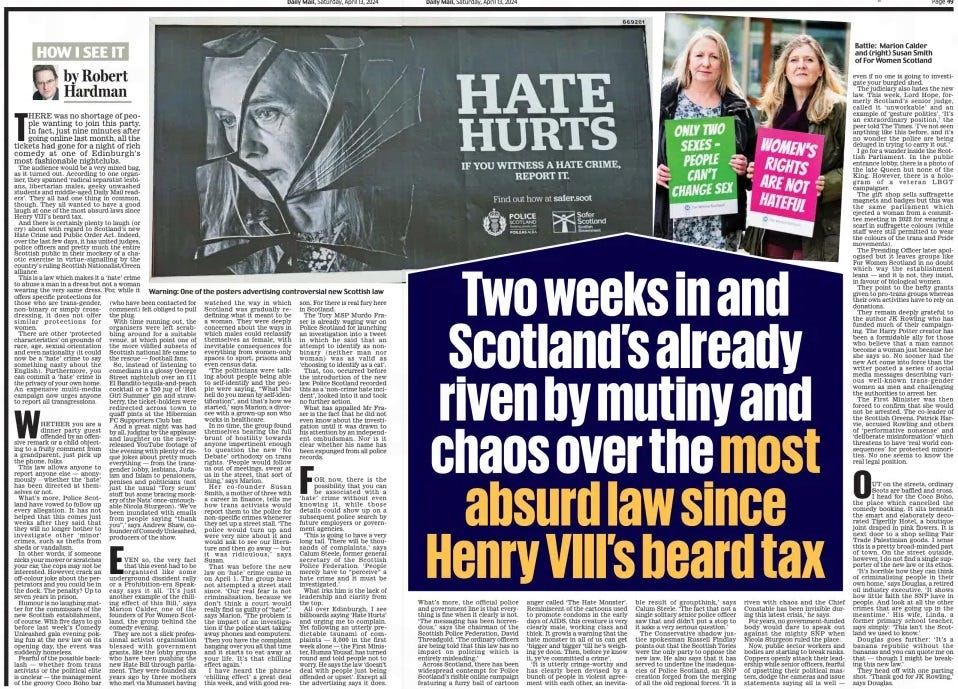
Daily Telegraph
- For the second week in a row, the Daily Telegraph for Saturday was unavailable on Pressreader.
Sunday 14 April
The Observer
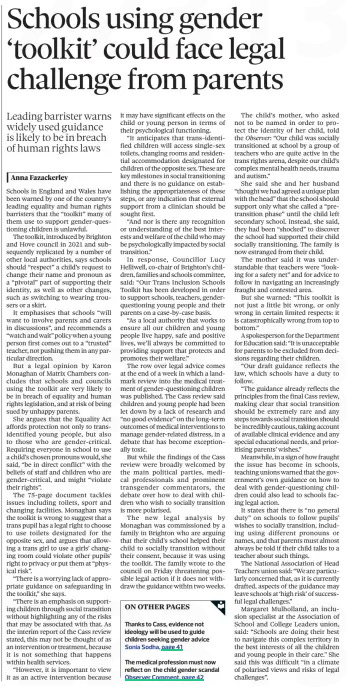
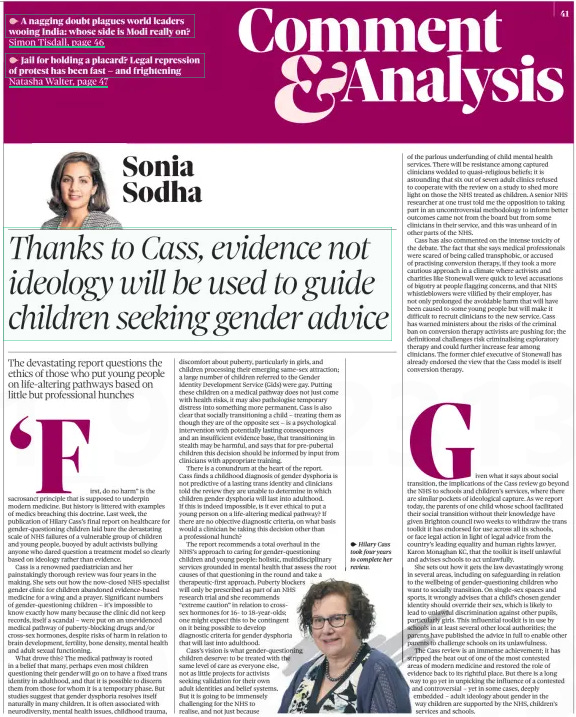
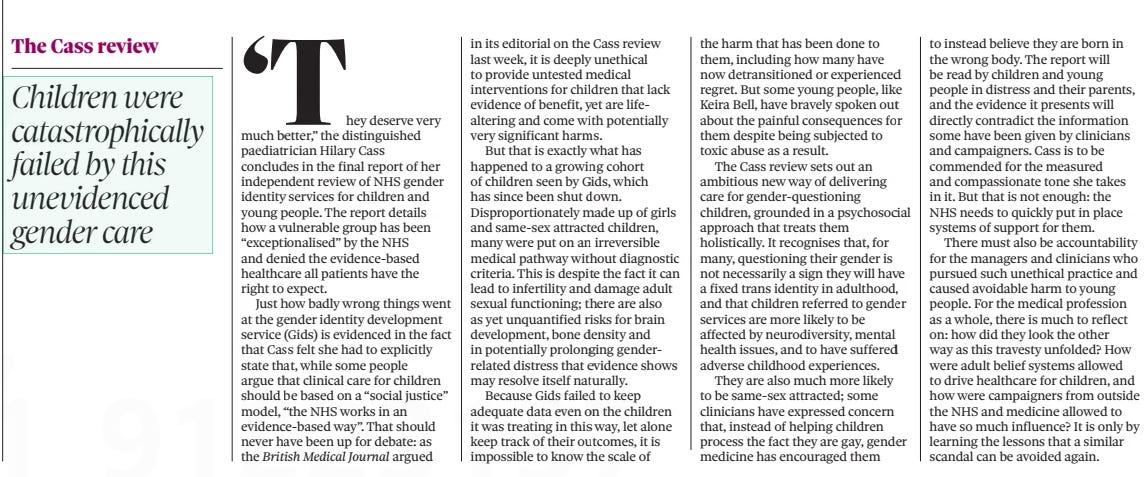
The Sunday Times
![Badenoch fury at ‘cowardice’ over gender Broadside at NHS, politicians and universities Harry Yorke and Sian Griffiths The battle over gender ideology is only just beginning, Kemi Badenoch warns today, as she calls for “more bravery and less cancel culture” in the wake of a landmark review of child gender services. In her first public intervention since the publication of Dr Hilary Cass’s report, the business secretary calls for a review into public bodies and their policies on transgender issues. She also launches an extraordinary broadside against politicians of every stripe, the police, the media, the NHS and universities. She says the “cowardice of those in positions of influence” was “worse than the ravings of the militants”. Badenoch’s comments will be welcomed by right-wing Tory MPs but seen by critics as seeking to reignite the so-called culture wars that have dominated British politics since the last election. Cass found that children experiencing gender distress and wanting to transition had been let down by a lack of research and “remarkably weak” evidence on medical interventions such as puberty blockers. Badenoch, who is also minister for women and equalities, claimed the recommendations could not be fully delivered until the government addressed the “underlying problem” of “ideological capture” in British institutions. Cass called for more NHS research into young people seeking help over their gender, different approaches to care depending on a child’s age and a more cautious attitude to social transitioning. Related developments: ● Cass reveals today that she stayed off social media and her team had to screen her emails to shield her from “toxic” abuse. ● She warns of “dangerous” influences online trying to convince children they were transgender. ● Women in Brighton have protested against a GP they allege prescribed cross-sex hormones to 16-year-olds without their parents’ knowledge. Writing in The Sunday Times, Badenoch, seen as a frontrunner to become the next Tory leader, says: “Over three decades, politicians of all parties have outsourced power to so-called independent institutions. They were meant to take the politics out of decision-making but have themselves become politicised, often with little to no ministerial oversight. “They may be independent, but they are no longer impartial. As politicians ceded control, many institutions became captured by a minority of ideological activists.” She adds: “At the heart of many of the review’s recommendations is a failure of institutions to selfregulate. Ministers have intervened time and again, but it is time for institutional leaders to step up and recover impartiality. It is also time for an in-depth review of decision-making across the public sector. How is it that senior leaders ignore the law and allow groups like Stonewall [an LGBT rights charity] to make up what it should be?” The Cass review, which looked at gender identity services for under-18s, was commissioned in 2020 following a sharp increase in patients being referred to the health service who were questioning their gender. It came after whistleblowers raised concerns about care at the gender identity and development service (Gids), the only specialist gender clinic for children and young people in England and Wales. It shut last month, four years after it was rated inadequate by inspectors, with regional hubs in London and Liverpool replacing it. Cass, a former president of the Royal College of Paediatrics and Child Health, concluded there was a “lack of evidence” on the long-term impact of taking hormones from an early age and studies had been “exaggerated or misrepresented by people on all sides of the debate to support their viewpoint”. She also said that the “toxicity” of the row over gender and trans issues had made medical professionals “afraid” to openly discuss their views. The NHS has been prescribing puberty blockers since 2011, but in March it said they would no longer be available to under-16s unless they were participating in a clinical trial. Cass has also revealed that six of the seven NHS adult gender clinics “thwarted” her report on children’s services by failing to share data on the long-term consequences of medical interventions. The NHS has now ordered a separate independent review of services for adults amid concerns that they have been “captured by ideology”. Adult clinics have agreed to comply, but Badenoch writes today that they too should be “held to account”. Badenoch fury at ‘cowardice’ over gender Broadside at NHS, politicians and universities Harry Yorke and Sian Griffiths The battle over gender ideology is only just beginning, Kemi Badenoch warns today, as she calls for “more bravery and less cancel culture” in the wake of a landmark review of child gender services. In her first public intervention since the publication of Dr Hilary Cass’s report, the business secretary calls for a review into public bodies and their policies on transgender issues. She also launches an extraordinary broadside against politicians of every stripe, the police, the media, the NHS and universities. She says the “cowardice of those in positions of influence” was “worse than the ravings of the militants”. Badenoch’s comments will be welcomed by right-wing Tory MPs but seen by critics as seeking to reignite the so-called culture wars that have dominated British politics since the last election. Cass found that children experiencing gender distress and wanting to transition had been let down by a lack of research and “remarkably weak” evidence on medical interventions such as puberty blockers. Badenoch, who is also minister for women and equalities, claimed the recommendations could not be fully delivered until the government addressed the “underlying problem” of “ideological capture” in British institutions. Cass called for more NHS research into young people seeking help over their gender, different approaches to care depending on a child’s age and a more cautious attitude to social transitioning. Related developments: ● Cass reveals today that she stayed off social media and her team had to screen her emails to shield her from “toxic” abuse. ● She warns of “dangerous” influences online trying to convince children they were transgender. ● Women in Brighton have protested against a GP they allege prescribed cross-sex hormones to 16-year-olds without their parents’ knowledge. Writing in The Sunday Times, Badenoch, seen as a frontrunner to become the next Tory leader, says: “Over three decades, politicians of all parties have outsourced power to so-called independent institutions. They were meant to take the politics out of decision-making but have themselves become politicised, often with little to no ministerial oversight. “They may be independent, but they are no longer impartial. As politicians ceded control, many institutions became captured by a minority of ideological activists.” She adds: “At the heart of many of the review’s recommendations is a failure of institutions to selfregulate. Ministers have intervened time and again, but it is time for institutional leaders to step up and recover impartiality. It is also time for an in-depth review of decision-making across the public sector. How is it that senior leaders ignore the law and allow groups like Stonewall [an LGBT rights charity] to make up what it should be?” The Cass review, which looked at gender identity services for under-18s, was commissioned in 2020 following a sharp increase in patients being referred to the health service who were questioning their gender. It came after whistleblowers raised concerns about care at the gender identity and development service (Gids), the only specialist gender clinic for children and young people in England and Wales. It shut last month, four years after it was rated inadequate by inspectors, with regional hubs in London and Liverpool replacing it. Cass, a former president of the Royal College of Paediatrics and Child Health, concluded there was a “lack of evidence” on the long-term impact of taking hormones from an early age and studies had been “exaggerated or misrepresented by people on all sides of the debate to support their viewpoint”. She also said that the “toxicity” of the row over gender and trans issues had made medical professionals “afraid” to openly discuss their views. The NHS has been prescribing puberty blockers since 2011, but in March it said they would no longer be available to under-16s unless they were participating in a clinical trial. Cass has also revealed that six of the seven NHS adult gender clinics “thwarted” her report on children’s services by failing to share data on the long-term consequences of medical interventions. The NHS has now ordered a separate independent review of services for adults amid concerns that they have been “captured by ideology”. Adult clinics have agreed to comply, but Badenoch writes today that they too should be “held to account”.](https://substackcdn.com/image/fetch/w_1456,c_limit,f_auto,q_auto:good,fl_progressive:steep/https%3A%2F%2Fsubstack-post-media.s3.amazonaws.com%2Fpublic%2Fimages%2Fe8a96ef6-7bb1-4c64-8efc-960d23998bca_536x559.png)
![Doctor exploits NHS loophole to prescribe hormones for children Despite a warning against the controversial drugs in the Cass report on transgender care, a Brighton GP is still handing them out Rosie Kinchen Protesters gather at the clinic where Dr Sam Hall operates the Trans Health Hub. It has more than a thousand patients It is 7pm in Hove and through the mist come seven figures — one dressed as a large inflatable dinosaur. The figures are women, and they are protesting against Sam Hall, a GP who they say has been prescribing cross-sex hormones to 16-yearolds, sometimes without their parents’ knowledge or consent. Last week the Cass report concluded the NHS has been failing thousands of children by prescribing puberty blockers and cross-sex hormones despite “remarkably weak evidence”. Dr Hilary Cass, the report’s author, called for a “fundamental change of direction” but nowhere is more emblematic of how hard that may be to realise than in Brighton & Hove. Hall, a trans man, who has described his experience of hormones as “sublime” is something of a hero here, closely aligned to a network of charities and schools. He has been championed as a trailblazer on posters around the city. Lesley Hammond, 69, who is holding up a banner bearing the words: “First do no harm?” has had enough. “We are aware that Sam Hall has been providing bridging prescriptions, sometimes to children as young as 16. We think this is very wrong,” she says. Medical support for gender-dysphoric young people has ground to a halt since Cass published her interim report two years ago. The Gender Identity Development Service (Gids), an NHS clinic in London, closed last month. It was replaced by two regional hubs, but waiting lists for treatment have spiralled to four years. In this void a series of private clinics have opened, prescribing puberty blockers and cross-sex hormones to desperate young people for a fee. But Hall, who works at the WellBN clinic, has been doing so within the NHS. Hannah Barnes exposed this in the updated edition of her book about Gids, Time to Think, and spoke to parents to whose children Hall had prescribed cross-sex hormones after only one consultation. One of them was Mary*. Her daughter has severe autism and ADHD and first started to express confusion about her gender in April 2022, when she was 15. She is very intelligent, but like many autistic young people she was prone to fixations, her mother says, and struggled to understand long-term consequences: “She’s got the emotional regulation of a seven-year-old and the impulse control of a three-year-old.” The family were seeking support from psychologists and counsellors, and had agreed with their daughter that she would not embark on medical treatment until she was 18. However, in February last year they discovered that she had been prescribed testosterone by Hall after a blood test and a consultation with him lasting about ten minutes. Mary was horrified: “She’s started taking a drug that has irreversible consequences at a time in life where her brain and her body are still developing.” Hall appears to be using a loophole in NHS guidelines that allows GPs to prescribe “bridging prescriptions” to patients in acute distress while they await a specialist service, for example for pain relief to cancer patients, despite the fact that NHS guidance states that such prescriptions should be used only for adults. Cross-sex hormones, which begin the medical transition, have never been used in this way before. At the Gids clinic, 16-year-olds could be prescribed the drugs only after spending a minimum of a year on puberty blockers (for which they would have had a minimum of three assessments). The Cass report states that the evidence for the indicated uses of puberty blockers and masculinising/feminising hormones in adolescents are unproven and the benefits and harms unknown. As a result she advised “extreme caution” and a clear rationale for providing hormones at this stage, rather than waiting until patients reach 18, and only after they have been seen by a specialist in gender dysphoria or from a multidisciplinary team. Mary’s daughter has never had a diagnosis. Hall did not respond to request for comment, but a spokesman for the WellBN clinic said: “We can’t discuss an individual patient’s care without consent, but if any parents of patients wish to contact the practice to discuss their care we would encourage them to do so.” He highlighted a page on its website that states: “Since 2016 [we] have prescribed hormones to people as indicated by their presentation and using an informed consent model of care that underpins all primary care. We have established robust pathways, a multidisciplinary team and built expertise amongst our clinicians in the prescription of hormones to thousands of patients in the past eight years and have access to specialist advice when needed.” The spokesman also highlighted guidance from NHS England which advises that hormones can be given to people “around the age of 16” so long as they have been seen by a specialist multidisciplinary team, have agreed on a care pathway and have “cognitive and emotional maturity to consent”. NHS England is reviewing these guidelines in line with recommendations in the Cass report. Hall, who transitioned as an adult having married and had three children, is a revered figure in Brighton. Posters celebrating him as a “trailblazer” were seen during last year’s Pride parade. He works with the local trans youth charity Allsorts, dubbed “the Mermaids of the south coast” — the trans charity that lobbied doctors at Gids and supports the use of puberty blockers. In 2020 he launched the Trans Health Hub at WellBN, the GP practice where he works. Since then the service has grown from 35 patients to more than a thousand. It is believed to have a waiting list of 8 to 12 weeks. This success has been driven by charities. In October Gendered Intelligence, another trans-led charity involved with Gids, wrote to the families on its mailing list to tell them about this “opportunity” for “trans-affirming primary healthcare”. Parents and carers were told WellBN “is a Brighton-based NHS general practice” that will take “out-of-area patients” and that can “prescribe blockers/HRT under their informed consent model for anyone 16–18”. Mary is in contact with at least ten other families whose 16-year-olds have been prescribed cross-sex hormones by Hall. Many were directed to him by Allsorts, which also works closely with local schools and was brought in by the council to provide training to social workers. Some are grateful for his support. Keith* took his daughter to see Hall after her 16th birthday last year and describes him as “very helpful and fair”. He does not think he was pushing a medicalised approach. “What happens to children with gender dysphoria is that they get lost in the system, no one knows what to do with them.” He thinks Hall is doing the best he can in “a broken system”. NHS England is seeking advice from the health department on closing loopholes that let private clinics continue to prescribe puberty blockers and hormones. But Hall appears to be operating in a grey area. Mary has raised her concerns with the Care Quality Commission, which did not respond. NHS England has passed the problem to the national medical director and director of primary care. Mary is awaiting a response. Doctor exploits NHS loophole to prescribe hormones for children Despite a warning against the controversial drugs in the Cass report on transgender care, a Brighton GP is still handing them out Rosie Kinchen Protesters gather at the clinic where Dr Sam Hall operates the Trans Health Hub. It has more than a thousand patients It is 7pm in Hove and through the mist come seven figures — one dressed as a large inflatable dinosaur. The figures are women, and they are protesting against Sam Hall, a GP who they say has been prescribing cross-sex hormones to 16-yearolds, sometimes without their parents’ knowledge or consent. Last week the Cass report concluded the NHS has been failing thousands of children by prescribing puberty blockers and cross-sex hormones despite “remarkably weak evidence”. Dr Hilary Cass, the report’s author, called for a “fundamental change of direction” but nowhere is more emblematic of how hard that may be to realise than in Brighton & Hove. Hall, a trans man, who has described his experience of hormones as “sublime” is something of a hero here, closely aligned to a network of charities and schools. He has been championed as a trailblazer on posters around the city. Lesley Hammond, 69, who is holding up a banner bearing the words: “First do no harm?” has had enough. “We are aware that Sam Hall has been providing bridging prescriptions, sometimes to children as young as 16. We think this is very wrong,” she says. Medical support for gender-dysphoric young people has ground to a halt since Cass published her interim report two years ago. The Gender Identity Development Service (Gids), an NHS clinic in London, closed last month. It was replaced by two regional hubs, but waiting lists for treatment have spiralled to four years. In this void a series of private clinics have opened, prescribing puberty blockers and cross-sex hormones to desperate young people for a fee. But Hall, who works at the WellBN clinic, has been doing so within the NHS. Hannah Barnes exposed this in the updated edition of her book about Gids, Time to Think, and spoke to parents to whose children Hall had prescribed cross-sex hormones after only one consultation. One of them was Mary*. Her daughter has severe autism and ADHD and first started to express confusion about her gender in April 2022, when she was 15. She is very intelligent, but like many autistic young people she was prone to fixations, her mother says, and struggled to understand long-term consequences: “She’s got the emotional regulation of a seven-year-old and the impulse control of a three-year-old.” The family were seeking support from psychologists and counsellors, and had agreed with their daughter that she would not embark on medical treatment until she was 18. However, in February last year they discovered that she had been prescribed testosterone by Hall after a blood test and a consultation with him lasting about ten minutes. Mary was horrified: “She’s started taking a drug that has irreversible consequences at a time in life where her brain and her body are still developing.” Hall appears to be using a loophole in NHS guidelines that allows GPs to prescribe “bridging prescriptions” to patients in acute distress while they await a specialist service, for example for pain relief to cancer patients, despite the fact that NHS guidance states that such prescriptions should be used only for adults. Cross-sex hormones, which begin the medical transition, have never been used in this way before. At the Gids clinic, 16-year-olds could be prescribed the drugs only after spending a minimum of a year on puberty blockers (for which they would have had a minimum of three assessments). The Cass report states that the evidence for the indicated uses of puberty blockers and masculinising/feminising hormones in adolescents are unproven and the benefits and harms unknown. As a result she advised “extreme caution” and a clear rationale for providing hormones at this stage, rather than waiting until patients reach 18, and only after they have been seen by a specialist in gender dysphoria or from a multidisciplinary team. Mary’s daughter has never had a diagnosis. Hall did not respond to request for comment, but a spokesman for the WellBN clinic said: “We can’t discuss an individual patient’s care without consent, but if any parents of patients wish to contact the practice to discuss their care we would encourage them to do so.” He highlighted a page on its website that states: “Since 2016 [we] have prescribed hormones to people as indicated by their presentation and using an informed consent model of care that underpins all primary care. We have established robust pathways, a multidisciplinary team and built expertise amongst our clinicians in the prescription of hormones to thousands of patients in the past eight years and have access to specialist advice when needed.” The spokesman also highlighted guidance from NHS England which advises that hormones can be given to people “around the age of 16” so long as they have been seen by a specialist multidisciplinary team, have agreed on a care pathway and have “cognitive and emotional maturity to consent”. NHS England is reviewing these guidelines in line with recommendations in the Cass report. Hall, who transitioned as an adult having married and had three children, is a revered figure in Brighton. Posters celebrating him as a “trailblazer” were seen during last year’s Pride parade. He works with the local trans youth charity Allsorts, dubbed “the Mermaids of the south coast” — the trans charity that lobbied doctors at Gids and supports the use of puberty blockers. In 2020 he launched the Trans Health Hub at WellBN, the GP practice where he works. Since then the service has grown from 35 patients to more than a thousand. It is believed to have a waiting list of 8 to 12 weeks. This success has been driven by charities. In October Gendered Intelligence, another trans-led charity involved with Gids, wrote to the families on its mailing list to tell them about this “opportunity” for “trans-affirming primary healthcare”. Parents and carers were told WellBN “is a Brighton-based NHS general practice” that will take “out-of-area patients” and that can “prescribe blockers/HRT under their informed consent model for anyone 16–18”. Mary is in contact with at least ten other families whose 16-year-olds have been prescribed cross-sex hormones by Hall. Many were directed to him by Allsorts, which also works closely with local schools and was brought in by the council to provide training to social workers. Some are grateful for his support. Keith* took his daughter to see Hall after her 16th birthday last year and describes him as “very helpful and fair”. He does not think he was pushing a medicalised approach. “What happens to children with gender dysphoria is that they get lost in the system, no one knows what to do with them.” He thinks Hall is doing the best he can in “a broken system”. NHS England is seeking advice from the health department on closing loopholes that let private clinics continue to prescribe puberty blockers and hormones. But Hall appears to be operating in a grey area. Mary has raised her concerns with the Care Quality Commission, which did not respond. NHS England has passed the problem to the national medical director and director of primary care. Mary is awaiting a response.](https://substackcdn.com/image/fetch/w_1456,c_limit,f_auto,q_auto:good,fl_progressive:steep/https%3A%2F%2Fsubstack-post-media.s3.amazonaws.com%2Fpublic%2Fimages%2F565ee7bc-17e3-44ee-acee-4bdf31154458_556x689.png)
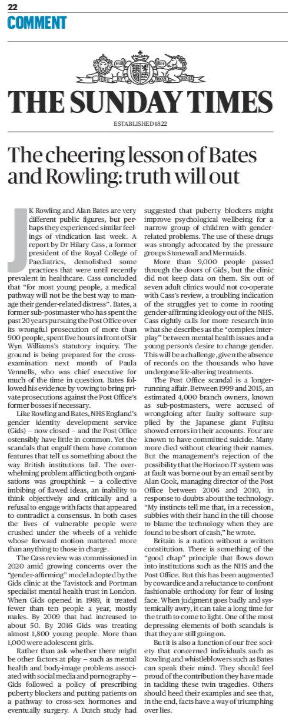
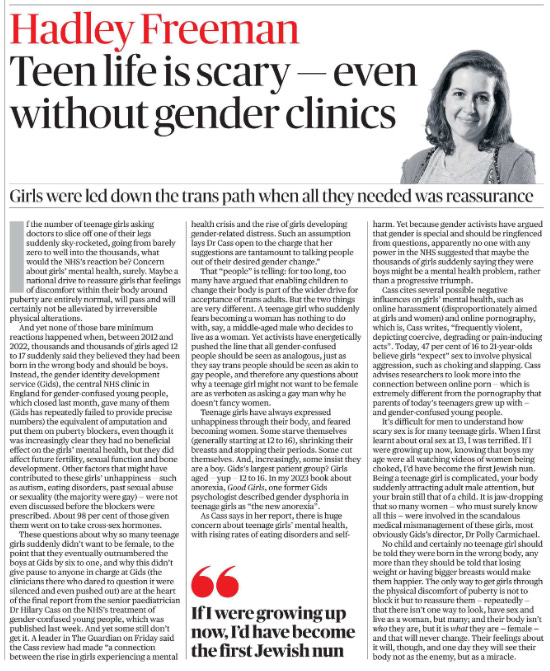
Mail on Sunday
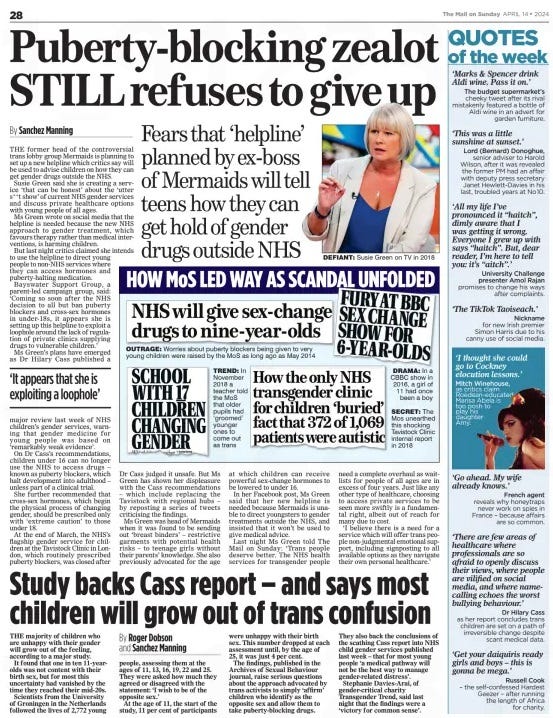
Sunday Telegraph

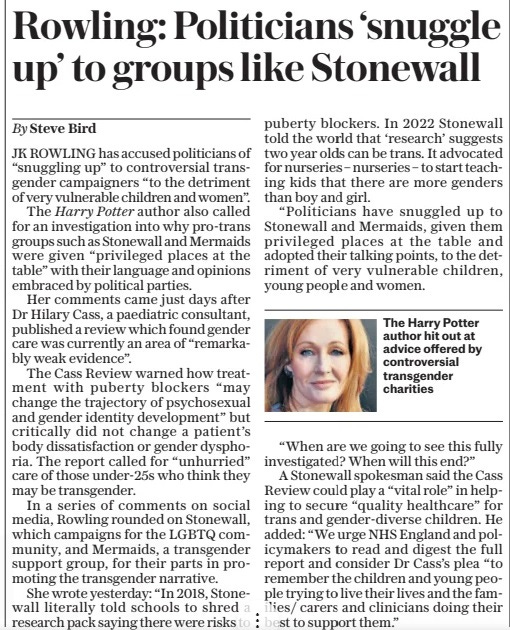
![Taxpayers fund study into ‘transphobic archaeology’ The Sunday Telegraph14 Apr 2024By Charlotte Gill THE taxpayer is funding a PhD researcher who is exploring the “Transphobic Innovations of Archaeology” at the University of York, prompting one Conservative MP to call for a review of the use of taxpayer funds for higher education. The student, who is being paid a stipend by the Arts and Humanities Research Council (AHRC) of approximately £18,622 a year, presented a paper earlier this year titled Bones Don’t Care About Your Feelings: Challenging Transphobic Innovations of Archeology in (Social) Media. A slide from the presentation asks: “What if I told you that when an archeologist finds human remains, it is a fact that there [sic] only two choices for gender identification.” The slide features branding for the University of York, UK Research and Innovation (UKRI) – a non-departmental government body that distributes funds for research – and AHRC’s White Rose University Consortium (a doctoral training partnership between the Universities of Leeds, Sheffield and York). Nick Fletcher, the Conservative MP, said: “We need to call a scam a scam when we see it. This is taxpayers’ money, at a time when households are struggling – and the tax burden at an all time high. “We should consider establishing a ‘Taxpayers’ Review Process’ to enable ordinary people to review and challenge UKRI and AHRC spending – similar to the process available for residents to review and challenge local authority accounts.” Dr Emma Hilton, a developmental biologist and co-founder of Sex Matters, told The Telegraph: “Human remains cannot tell us anything about the unem-bodied ‘gender identity’ of a person. “A female Viking warrior buried with male-typical war possessions tells us only that some women successfully broke through early glass ceilings.” A UKRI spokesman said: “UKRI invests in a diverse research and innovation portfolio. Decisions to fund the research projects we support are made via a rigorous peer review process by relevant independent experts from across academia and business. “The research councils also award block grants to Higher Education institutions to support PhD studentships. The institutions make decisions and allocate the funding to specific studentship proposals, following an application process.” York University was approached for comment. Article Name:Taxpayers fund study into ‘transphobic archaeology’ Publication:The Sunday Telegraph Author:By Charlotte Gill Start Page:5 End Page:5 Taxpayers fund study into ‘transphobic archaeology’ The Sunday Telegraph14 Apr 2024By Charlotte Gill THE taxpayer is funding a PhD researcher who is exploring the “Transphobic Innovations of Archaeology” at the University of York, prompting one Conservative MP to call for a review of the use of taxpayer funds for higher education. The student, who is being paid a stipend by the Arts and Humanities Research Council (AHRC) of approximately £18,622 a year, presented a paper earlier this year titled Bones Don’t Care About Your Feelings: Challenging Transphobic Innovations of Archeology in (Social) Media. A slide from the presentation asks: “What if I told you that when an archeologist finds human remains, it is a fact that there [sic] only two choices for gender identification.” The slide features branding for the University of York, UK Research and Innovation (UKRI) – a non-departmental government body that distributes funds for research – and AHRC’s White Rose University Consortium (a doctoral training partnership between the Universities of Leeds, Sheffield and York). Nick Fletcher, the Conservative MP, said: “We need to call a scam a scam when we see it. This is taxpayers’ money, at a time when households are struggling – and the tax burden at an all time high. “We should consider establishing a ‘Taxpayers’ Review Process’ to enable ordinary people to review and challenge UKRI and AHRC spending – similar to the process available for residents to review and challenge local authority accounts.” Dr Emma Hilton, a developmental biologist and co-founder of Sex Matters, told The Telegraph: “Human remains cannot tell us anything about the unem-bodied ‘gender identity’ of a person. “A female Viking warrior buried with male-typical war possessions tells us only that some women successfully broke through early glass ceilings.” A UKRI spokesman said: “UKRI invests in a diverse research and innovation portfolio. Decisions to fund the research projects we support are made via a rigorous peer review process by relevant independent experts from across academia and business. “The research councils also award block grants to Higher Education institutions to support PhD studentships. The institutions make decisions and allocate the funding to specific studentship proposals, following an application process.” York University was approached for comment. Article Name:Taxpayers fund study into ‘transphobic archaeology’ Publication:The Sunday Telegraph Author:By Charlotte Gill Start Page:5 End Page:5](https://substackcdn.com/image/fetch/w_1456,c_limit,f_auto,q_auto:good,fl_progressive:steep/https%3A%2F%2Fsubstack-post-media.s3.amazonaws.com%2Fpublic%2Fimages%2F172b13db-77f2-4c04-b7c7-9ae3c956974e_513x639.jpeg)
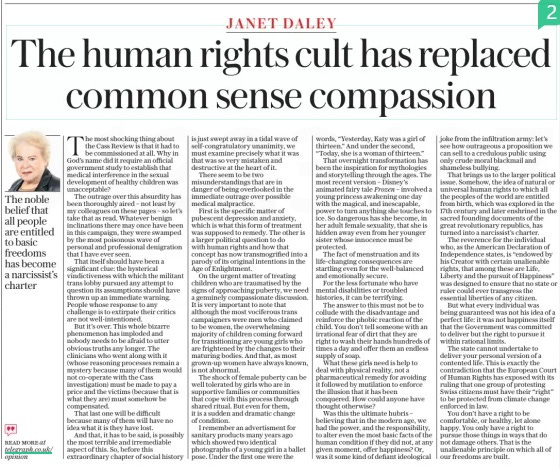
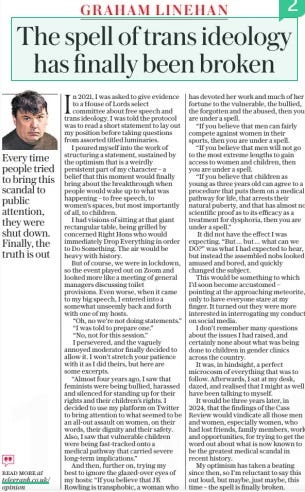
![I was prevented from raising the alarm about puberty blockers When neuropsychologist Sallie Baxendale questioned NHS treatment for gender dysphoria, she found herself the subject of sustained abuse. By The Sunday Telegraph14 Apr 2024Abigail Buchanan Professor Sallie Baxendale did not set out to challenge the orthodoxy on puberty blockers; her usual area of research is epilepsy. When Baxendale, a consultant clinical neuropsychologist in London, first read the claim that the controversial drugs were safe and reversible, “my first thought was, this is really exciting”, she says. “That doesn’t fit in with my understanding of how the brain works, so I want to go and see what the new evidence is… and I just couldn’t find any.” Prof Baxendale’s foray into this hotly contested area was accidental – the product of professional curiosity rather than an ideological agenda. Puberty blockers were not a topic of interest for her until she read, several years ago, that their effects were wholly reversible, a claim that was, at one point, on the NHS website and is still repeated by the transgender charity Mermaids. “From a neuropsychology point of view, [pubertal suppression] is really interesting,” she says, speaking on the phone from her office at the UCL Institute of Neurology. “We know that puberty is an important time in neurodevelopment, and we know that when it gets interrupted by other things, there are impacts on cognitive development.” If there were a way round that, it could potentially have ramifications for Baxendale’s other work. She was appalled to find an absence of evidence showing that the cognitive effects of puberty blockers were fully reversible, even though this was a treatment that had been adopted worldwide and was available on the NHS. “There is no evidence, because nobody’s looked at it,” she says. “People were really looking at puberty just from the development of sex organs and physical changes. But from a neuropsychological perspective, puberty is really important for cognitive development – in adolescence, the brain undergoes all sorts of changes.” But when Baxendale came to publish her review of the existing literature on the subject, she found it was an academic hot potato, rejected by three journals. As is usual, her analysis was subject to anonymous peer review processes before publication, but in each case she found herself criticised by the reviewers and the analysis was turned down. She claims this was “nothing to do with the way I’d conducted the study” – it was rejected because “they did not like the findings”. “The reasons given for rejecting it were quite extraordinary,” she says. “One was ‘this will stigmatise an already stigmatised group’… One [review] criticised me for using the terms ‘male’ and ‘female’... That’s what was so, so different compared to all the other papers I’ve published.” Anonymous reviewers cast aspersions about her motivation for exploring the topic in the first place. Baxendale is certainly not the first researcher to find herself caught in the crossfire of the most toxic argument in academia, but says her case highlights how, when it comes to gender medicine, “enthusiasm for treatment has overtaken the evidence”. Others in the field agree. Last month, the Dutch parliament ordered an investigation into the physical and mental health outcomes of children given puberty blockers – a dramatic about-turn given that the Netherlands pioneered the use of these drugs in a treatment protocol that was copied in the UK and around the world after it was published in 1998. Baxendale didn’t think her findings were controversial. “I didn’t think it was particularly earth-shattering,” she says. “It was basically, ‘We don’t know, we need to do some more research’.” She found that there had been more studies assessing the impact of puberty blockers on cognitive function in animals than in humans, and, in fact, most found that they had a detrimental effect. “Critical questions remain unanswered regarding the nature, extent and permanence of any arrested development of cognitive function associated with puberty blockers,” she concluded. “The impact of pubertal suppression on measures of neuropsychological function is an urgent research priority.” She did not say puberty blockers should not be prescribed – just that there had not been enough research into their cognitive effects. Campaigners insist that puberty blockers can form part of “holistic and supportive healthcare for trans youth”. Mermaids, the transgender charity, has claimed that denying a child’s right to change their gender identity could increase the risk of suicide. But the small number of studies that have assessed the impact of the drugs on children are flawed, Baxendale says. “No human studies have systematically explored the impact of these treatments on neuropsychological function with an adequate baseline and follow-up.” One credible piece of research – based on a single case study – actually found that puberty blockers caused an overall drop in IQ of 10 points. “You can’t say something is safe and reversible if you haven’t tested it to be safe and reversible,” she says. When Baxendale’s research was published in February this year, she faced an online backlash. “It has been quite distressing,” she says. “I’ve been called a eugenicist, an anti-trans activist, and I’m not even on social media.” Baxendale would do more research in the area were it not for the abuse she’s received since publication. “I would like to look at this again, but I would be quite wary of bringing other people onto the team early in their careers, because I wouldn’t want them to be associated with the accusations of bigotry and transphobia.” ‘You can’t say something is safe and reversible if you haven’t tested it to be safe and reversible’ Her academic colleagues were quietly supportive. “Lots of people reached out and had stories, said ‘I’m very concerned’, but none of them would go public and say that – because they see what happens when you do,” she says. “I can see how younger researchers would run a mile from this. It’s really really unpleasant… when all you’ve done is write a paper to help the people they say you want to harm. That will really put people off doing research, and that’s what’s so desperately needed.” With the publication of the landmark review into genderidentity services for young people by Dr Hilary Cass this week, Baxendale is vindicated, as are the other academics who have gone against what was prevailing wisdom on the treatment of young people seeking gender reassignment. The review concluded that the current treatment pathway for gender dysphoric young people is based on “remarkably weak evidence”. Its findings have led to a decision by NHS England to stop prescribing puberty blockers outside of clinical trials, but they remain available off-label via private prescriptions at non-NHS gender clinics. The now-defunct Gender Identity Development Service (GIDS) at the Tavistock and Portman NHS Foundation Trust began prescribing puberty blockers to children as young as 12 on a trial basis in 2011. In 2014, access to the drugs shifted from research-only to being available in general clinical practice, and GIDS lowered the prescription age from 16 to 11 – despite its own research finding they do not improve psychological wellbeing for distressed children as previously claimed. The clinic’s director praised them on a CBBC programme, saying: “The good thing is, if you stop the injections, it’s like pressing a start button and the body just carries on developing,” despite concerns about irreversibility. Baxendale hopes the Cass Review is a step in the right direction. “It was really clear that research needs to be embedded into the new services,” she says. “These people deserve the same as everybody else: evidence-based care. When any group becomes exceptional and the rules start to not apply – that’s when medicine goes off the rails.” Article Name:I was prevented from raising the alarm about puberty blockers Publication:The Sunday Telegraph Author:Abigail Buchanan Start Page:4 End Page:4 I was prevented from raising the alarm about puberty blockers When neuropsychologist Sallie Baxendale questioned NHS treatment for gender dysphoria, she found herself the subject of sustained abuse. By The Sunday Telegraph14 Apr 2024Abigail Buchanan Professor Sallie Baxendale did not set out to challenge the orthodoxy on puberty blockers; her usual area of research is epilepsy. When Baxendale, a consultant clinical neuropsychologist in London, first read the claim that the controversial drugs were safe and reversible, “my first thought was, this is really exciting”, she says. “That doesn’t fit in with my understanding of how the brain works, so I want to go and see what the new evidence is… and I just couldn’t find any.” Prof Baxendale’s foray into this hotly contested area was accidental – the product of professional curiosity rather than an ideological agenda. Puberty blockers were not a topic of interest for her until she read, several years ago, that their effects were wholly reversible, a claim that was, at one point, on the NHS website and is still repeated by the transgender charity Mermaids. “From a neuropsychology point of view, [pubertal suppression] is really interesting,” she says, speaking on the phone from her office at the UCL Institute of Neurology. “We know that puberty is an important time in neurodevelopment, and we know that when it gets interrupted by other things, there are impacts on cognitive development.” If there were a way round that, it could potentially have ramifications for Baxendale’s other work. She was appalled to find an absence of evidence showing that the cognitive effects of puberty blockers were fully reversible, even though this was a treatment that had been adopted worldwide and was available on the NHS. “There is no evidence, because nobody’s looked at it,” she says. “People were really looking at puberty just from the development of sex organs and physical changes. But from a neuropsychological perspective, puberty is really important for cognitive development – in adolescence, the brain undergoes all sorts of changes.” But when Baxendale came to publish her review of the existing literature on the subject, she found it was an academic hot potato, rejected by three journals. As is usual, her analysis was subject to anonymous peer review processes before publication, but in each case she found herself criticised by the reviewers and the analysis was turned down. She claims this was “nothing to do with the way I’d conducted the study” – it was rejected because “they did not like the findings”. “The reasons given for rejecting it were quite extraordinary,” she says. “One was ‘this will stigmatise an already stigmatised group’… One [review] criticised me for using the terms ‘male’ and ‘female’... That’s what was so, so different compared to all the other papers I’ve published.” Anonymous reviewers cast aspersions about her motivation for exploring the topic in the first place. Baxendale is certainly not the first researcher to find herself caught in the crossfire of the most toxic argument in academia, but says her case highlights how, when it comes to gender medicine, “enthusiasm for treatment has overtaken the evidence”. Others in the field agree. Last month, the Dutch parliament ordered an investigation into the physical and mental health outcomes of children given puberty blockers – a dramatic about-turn given that the Netherlands pioneered the use of these drugs in a treatment protocol that was copied in the UK and around the world after it was published in 1998. Baxendale didn’t think her findings were controversial. “I didn’t think it was particularly earth-shattering,” she says. “It was basically, ‘We don’t know, we need to do some more research’.” She found that there had been more studies assessing the impact of puberty blockers on cognitive function in animals than in humans, and, in fact, most found that they had a detrimental effect. “Critical questions remain unanswered regarding the nature, extent and permanence of any arrested development of cognitive function associated with puberty blockers,” she concluded. “The impact of pubertal suppression on measures of neuropsychological function is an urgent research priority.” She did not say puberty blockers should not be prescribed – just that there had not been enough research into their cognitive effects. Campaigners insist that puberty blockers can form part of “holistic and supportive healthcare for trans youth”. Mermaids, the transgender charity, has claimed that denying a child’s right to change their gender identity could increase the risk of suicide. But the small number of studies that have assessed the impact of the drugs on children are flawed, Baxendale says. “No human studies have systematically explored the impact of these treatments on neuropsychological function with an adequate baseline and follow-up.” One credible piece of research – based on a single case study – actually found that puberty blockers caused an overall drop in IQ of 10 points. “You can’t say something is safe and reversible if you haven’t tested it to be safe and reversible,” she says. When Baxendale’s research was published in February this year, she faced an online backlash. “It has been quite distressing,” she says. “I’ve been called a eugenicist, an anti-trans activist, and I’m not even on social media.” Baxendale would do more research in the area were it not for the abuse she’s received since publication. “I would like to look at this again, but I would be quite wary of bringing other people onto the team early in their careers, because I wouldn’t want them to be associated with the accusations of bigotry and transphobia.” ‘You can’t say something is safe and reversible if you haven’t tested it to be safe and reversible’ Her academic colleagues were quietly supportive. “Lots of people reached out and had stories, said ‘I’m very concerned’, but none of them would go public and say that – because they see what happens when you do,” she says. “I can see how younger researchers would run a mile from this. It’s really really unpleasant… when all you’ve done is write a paper to help the people they say you want to harm. That will really put people off doing research, and that’s what’s so desperately needed.” With the publication of the landmark review into genderidentity services for young people by Dr Hilary Cass this week, Baxendale is vindicated, as are the other academics who have gone against what was prevailing wisdom on the treatment of young people seeking gender reassignment. The review concluded that the current treatment pathway for gender dysphoric young people is based on “remarkably weak evidence”. Its findings have led to a decision by NHS England to stop prescribing puberty blockers outside of clinical trials, but they remain available off-label via private prescriptions at non-NHS gender clinics. The now-defunct Gender Identity Development Service (GIDS) at the Tavistock and Portman NHS Foundation Trust began prescribing puberty blockers to children as young as 12 on a trial basis in 2011. In 2014, access to the drugs shifted from research-only to being available in general clinical practice, and GIDS lowered the prescription age from 16 to 11 – despite its own research finding they do not improve psychological wellbeing for distressed children as previously claimed. The clinic’s director praised them on a CBBC programme, saying: “The good thing is, if you stop the injections, it’s like pressing a start button and the body just carries on developing,” despite concerns about irreversibility. Baxendale hopes the Cass Review is a step in the right direction. “It was really clear that research needs to be embedded into the new services,” she says. “These people deserve the same as everybody else: evidence-based care. When any group becomes exceptional and the rules start to not apply – that’s when medicine goes off the rails.” Article Name:I was prevented from raising the alarm about puberty blockers Publication:The Sunday Telegraph Author:Abigail Buchanan Start Page:4 End Page:4](https://substackcdn.com/image/fetch/w_1456,c_limit,f_auto,q_auto:good,fl_progressive:steep/https%3A%2F%2Fsubstack-post-media.s3.amazonaws.com%2Fpublic%2Fimages%2F32a60f93-7ca9-4352-a024-a29a99086f48_1183x740.jpeg)
Monday 15 April
The Guardian
- There are no articles about trans people in the Guardian’s Monday edition.
The Times
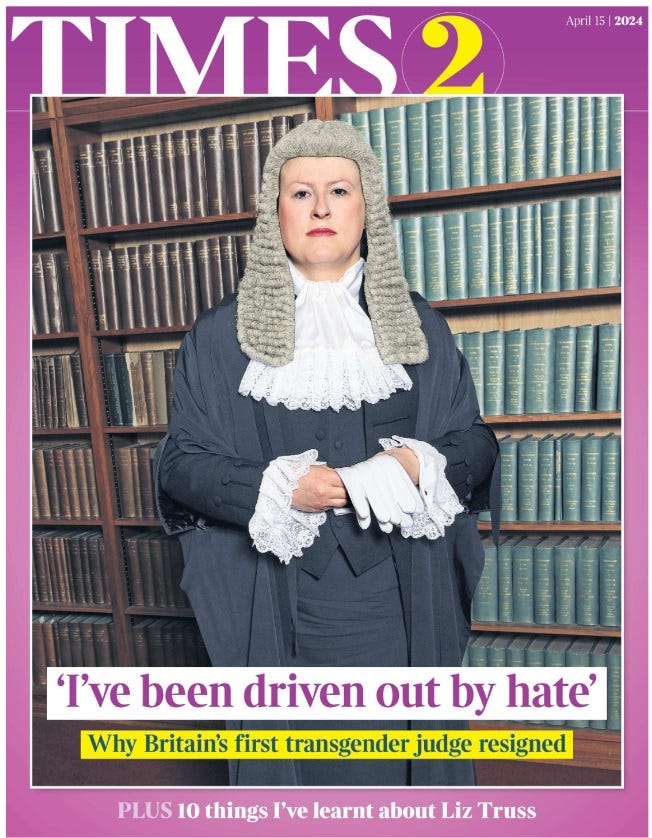
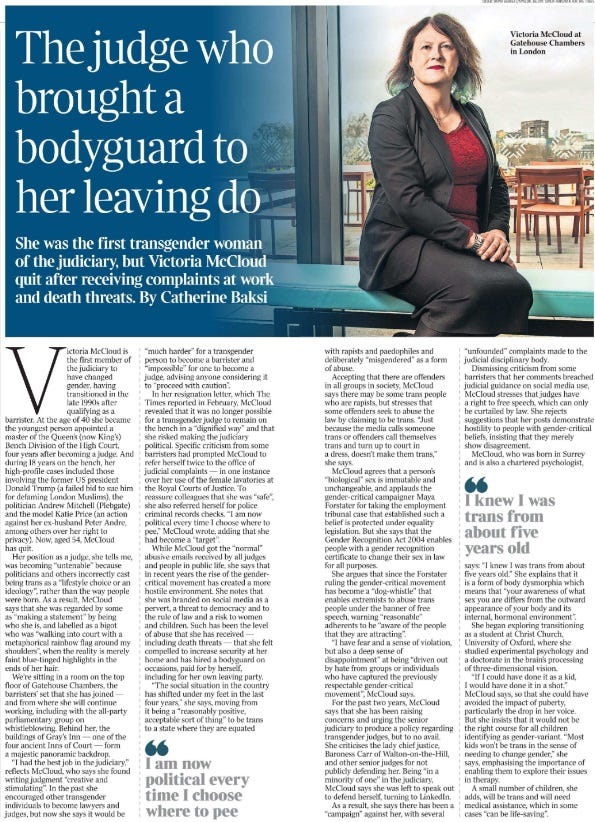
Daily Mail

Telegraph
- There are no articles about trans people in Monday’s edition of the Telegraph. True story.
THIS WEEK IN PARLIAMENT
House of Commons
- Adjournment debate – Rights of lesbian, gay, bisexual and gender non-conforming young people [more details here]. This has been raised by the anti-trans Alba MP, Neale Hanvey.
- The Cass Review could end up being discussed with a ministerial statement or Urgent Question, time allowing.
Westminster Hall
- No business that concerns this newsletter.
House of Lords
- Oral questions – Retaining training and knowledge for special educational needs in the school and college system [more details here].
Committees
- No business that concerns this newsletter.
AROUND THE WORLD
Germany enacts legislation simplifying name and gender changes [AP News]
- The German parliament has passed new legislation that simplifies the process for name and gender changes, marking a significant step in recognising and supporting the rights of trans people.
Lawsuit accuses former Kentucky swim coach of rape [Bleacher Report]
- A lawsuit has been filed against Lars Jorgensen, former Kentucky swim coach, accusing him of rape and sexual assault. This serious allegation adds to a troubling pattern of claims within the university’s athletics department. It is claimed that Jorgensen once coached Riley Gaines, who now spends her time campaigning against trans women in sport.
California transgender sanctuary law survives a legal challenge [Los Angeles Times]
- A report on how California‘s transgender sanctuary law stood firm against a legal challenge, with the judge ridiculing the plaintiff’s arguments.
Uganda’s Anti-Homosexuality Act upheld: A setback for LGBTIQ+ rights akin to Roe v. Wade [openDemocracy]
- A report on Uganda’s High Court decision to uphold the controversial Anti-Homosexuality Act, drawing parallels to the overturning of Roe v. Wade in the US.
ANY OTHER BUSINESS
London Trans Pride 2024 announced [Pink News]
- Details for the upcoming 2024 London Trans Pride have been announced, with the event taking place on 27 July 2024, starting at 1pm.
Tories suspend Lee Anderson’s wife over allegations [Mirror]
- The Conservative Party has suspended the wife of MP Lee Anderson after he posted a photograph on social media of her helping him campaign for Reform UK.
Donald Trump’s hush money trial begins
RECOMMENDED READING
- The British government is throwing young trans people under the bus [Dazed]
TRANSWRITES YOU MIGHT HAVE MISSED
- NHS & puberty blockers: Former GIDS patients reflect on long wait times, invasive assessments, by Sasha Baker.
- Serious police violence towards trans rights protesters outside “Gender Critical” conference, by Jess O’Thomson.
- Fanfiction was my gay-girl-to-gay-guy pipeline, and I’m proud of it, by Jesse Smith.
- What does Liz Truss’s anti-trans bill actually say? By Lee Hurley.
- Andrew Joseph White’s writing is exactly what autistic transgender people like me needed when we were younger, by Ayman Eckford.
SUPPORT THE TRANS AGENDA
Tired of the same old news narratives? Get ‘The Trans Agenda’ delivered right to your inbox – news with the trans community at the forefront. Subscribe now!
The Trans Agenda also needs your help. Your donation powers my reporting efforts, amplifying trans voices and keeps you in the know. Support independent trans journalism. Help keep in-depth reporting in ‘The Trans Agenda’ available and accessible by donating today!
CALL FOR STORIES
Seen something newsworthy related to the trans community in the UK? Send me a tip! I’m always looking for leads and underreported stories.

